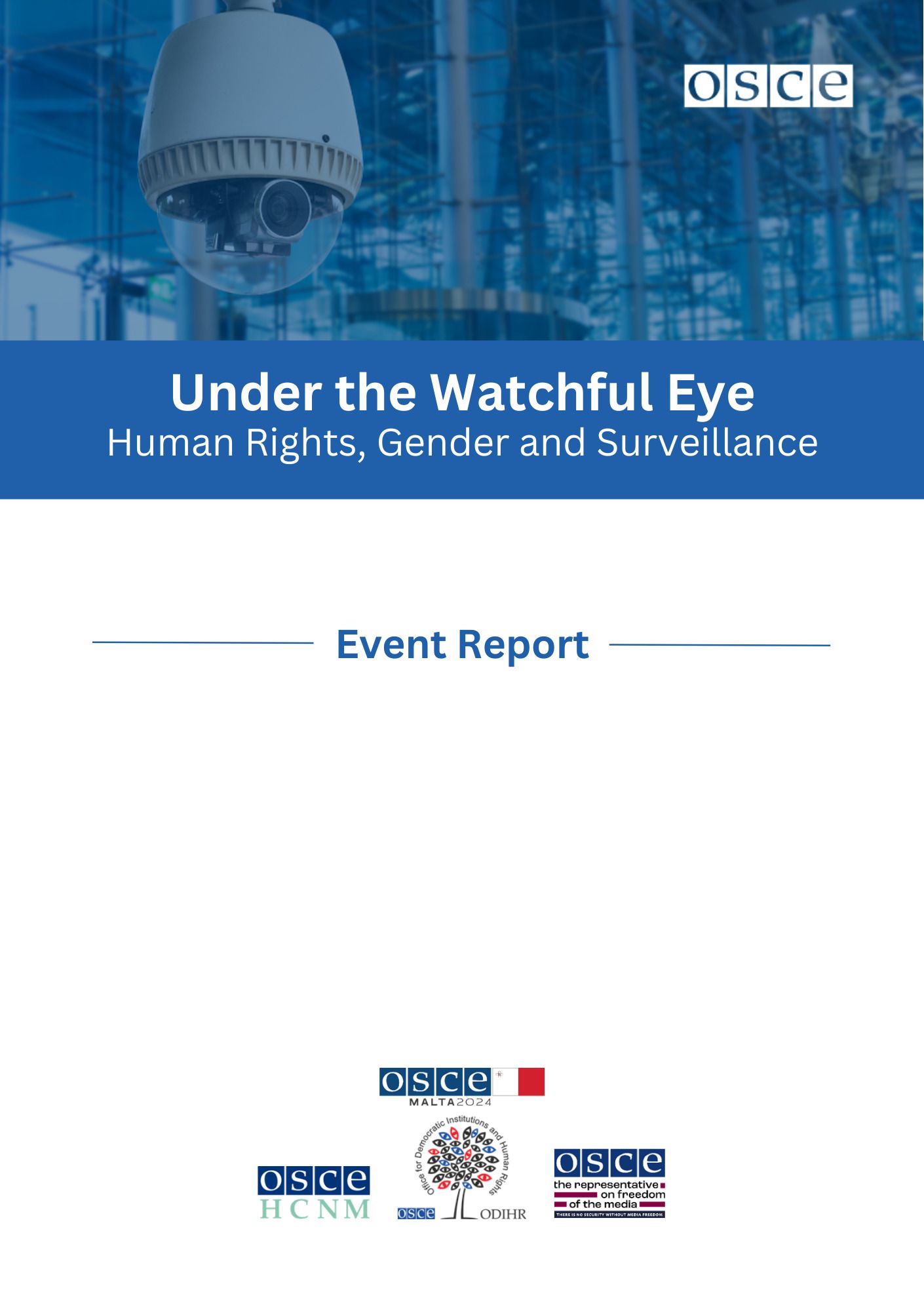
Under the Watchful Eye: Human Rights, Gender and Surveillance, Event Report
Office of the Representative on Freedom of the Media, Office for Democratic Institutions and Human Rights, Office of the High Commissioner on National Minorities, and the OSCE Parliamentary Assembly, supported by the OSCE Chaipersonship of Malta, March 2025
This outcome report follows the conference jointly organized by OSCE Institutions in March 2024 to mark International Women's Day 2024. It examines how surveillance technologies, whether deployed by State or private actors, often reinforce existing power imbalances and can perpetuate both gender-based discrimination and violence online and offline. In addition, the report discusses ways in which the human rights framework and digital technologies can be leverage to enhance human rights of women and girls, with a particular focus on minority women and female journalists in the OSCE region.
Go to resource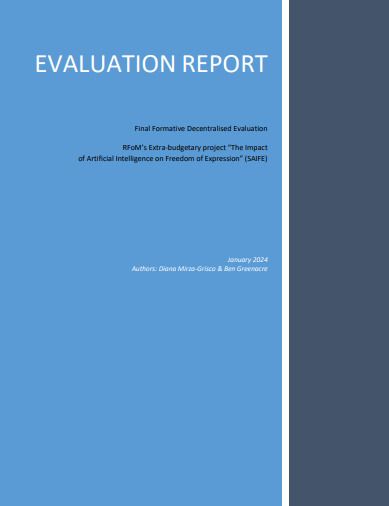
SAIFE Evaluation Report Executive Summary
Office of the OSCE Representative on Freedom of the Media, January 2024
The executive summary of the independent and decentralized evaluation of the SAIFE project (July 2019-December 2023) presents key findings and provides a final assessment of the project's results and impact. It also identifies lessons learned to increase the impact of future RFoM activities and projects pertaining to technology, digital rights and online free speech.
Go to resource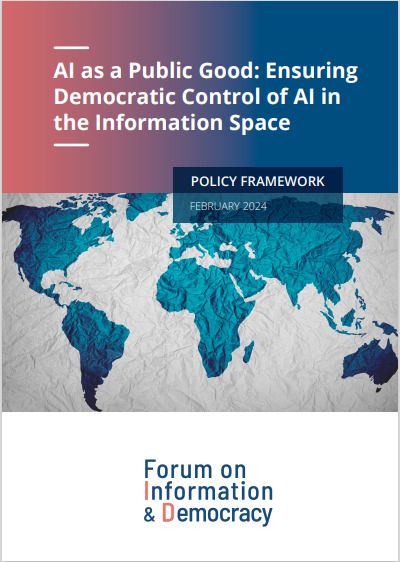
AI as a Public Good: Ensuring Democratic Control of AI in the Information Space
Forum on Information and Democracy, February 2024
This report is the result of the work conducting by the Forum's Policy Working Group on AI and its implications for the information and communication space. It presents recommendations addressed to States and AI companies, entities, and platforms aiming at ensuring a safe and responsible development and deployment of AI systems, establish appropriate liability and accountability regimes, and put in place governance and oversight mechanisms.
Go to resource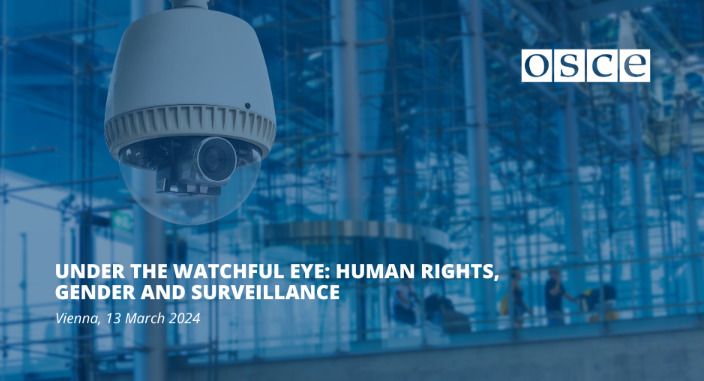
Under the Watchful Eye: Human Rights, Gender and Surveillance
Office of the Representative on Freedom of the Media, Office for Democratic Institutions and Human Rights, Office of the High Commissioner on National Minorities, and the OSCE Parliamentary Assembly, supported by the OSCE Chaipersonship of Malta, March 2024
This event was jointly organized by OSCE Institutions supported by the Chairpersonship of Malta to mark International Women's Day 2024. The conference examines the intersection of gender and digital surveillance. In bringing together the three dimensions of the OSCE, it explores the gendered aspects of the surveillance landscape within the broader context of comprehensive security.
Go to resource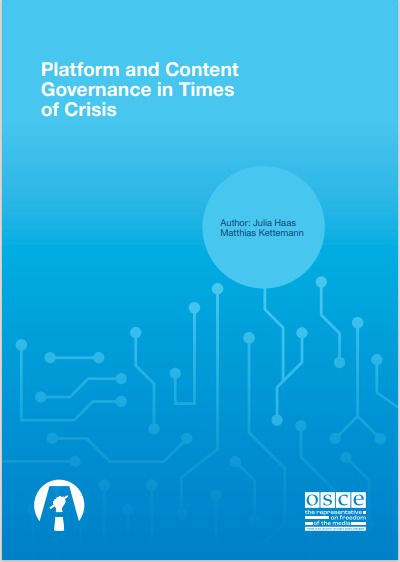
Platform and Content Governance in Times of Crisis
Office of the OSCE Representative on Freedom of the Media, April 2024
Following a first SAIFE expert workshop on content governance in times of crisis held in autumn 2022 and several thematic roundtables throughout 2023, this report provides five key considerations for state policy and regulatory frameworks towards healthy information spaces in time of crisis, building on the core principles of robust transparency, human rights due diligence, and accountability mechanisms.
Go to resource
Safeguarding the Integrity of Online Information Spaces
Office of the OSCE Representative on Freedom of the Media and the Forum on Information and Democracy, April 2024
At this webinar organized by OSCE Representative on Freedom of the Media and the Forum on Information and Democracy, the two institutions launched relevant reports to present ways forward to enhance access to reliable information and strengthen information integrity online in times of crisis.
Go to resource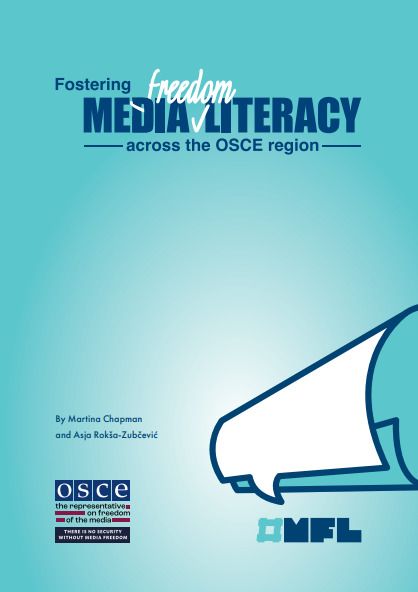
Fostering Media Freedom Literacy across the OSCE region report
Office of the OSCE Representative on Freedom of the Media, May 2024
This report forms part of a project designed to support policy-making processes, cross-sectoral collaboration and public awareness of media literacy in the OSCE participating States. Exploring and explaining the concept of media freedom literacy and the competencies and skills it encompasses, this report aims at providing a practical tool to help advance media freedom literacy across the OSCE region.
Go to resource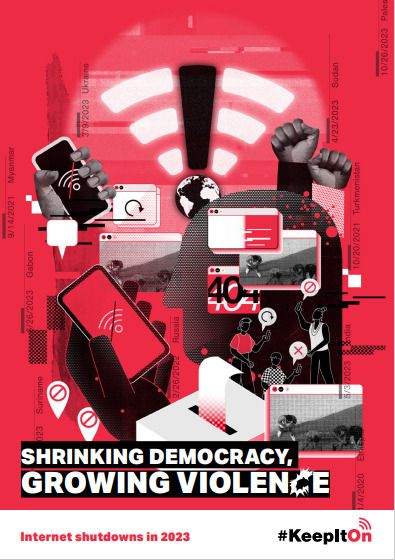
Shrinking Democracy, Growing Violence - Internet Shutdowns in 2023
Access Now, May 2024
This report from Access Now provides an analysis of the internet shutdowns observed around the world in 2023 by Access Now and the #KeepItOn coalition. It presents the main internet shutdowns' trends and triggers in 2023, as well as a detailed analysis on the main countries affected.
Go to resource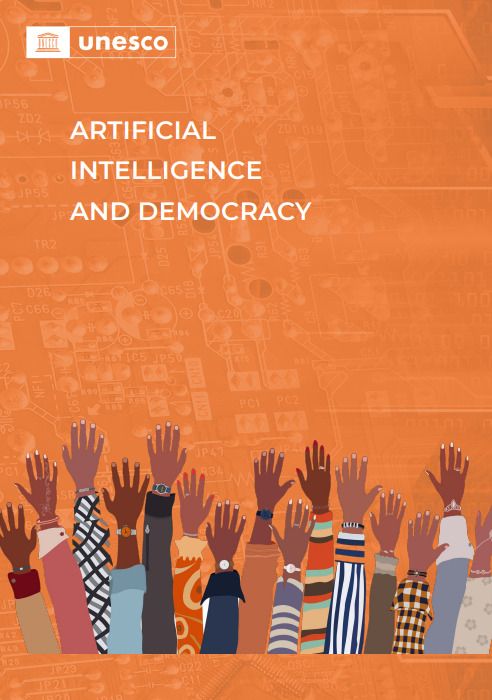
UNESCO Report Artificial Intelligence and Democracy
UNESCO, May 2024
This report builds on the "Recommendation on the Ethics of Artificial Intelligence", delving into the current and potential impact of AI on democracy and the benefits that both AI and digitalization could bring to enhancing collective decision-making processes.
Go to resource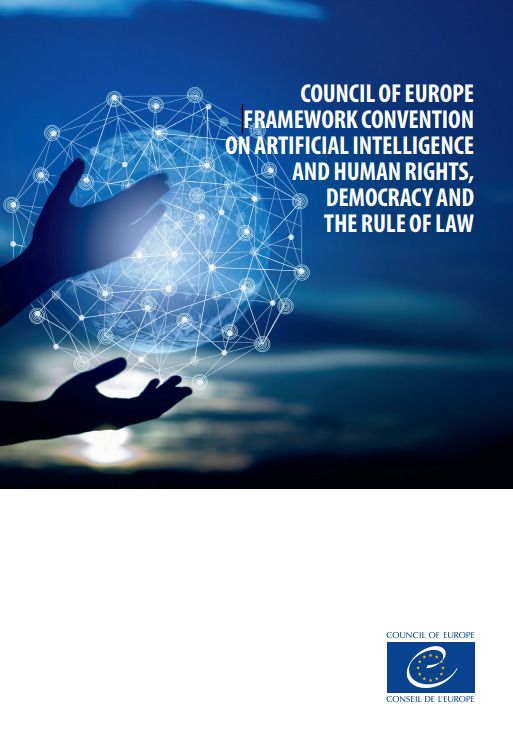
Framework Convention on Artificial Intelligence and Human Rights, Democracy and the Rule of Law
Council of Europe, May 2024
This Framework Convention is the first international legally binding instrument in the field of AI, human rights, democracy and the rule of law. It aims to ensure that activities within the lifecycle of artificial intelligence systems are fully consistent with human rights, democracy and the rule of law, while being conducive to technological progress and innovation. This Framework Convention also aims to fill any legal gaps that may result from rapid technological advances.
Go to resource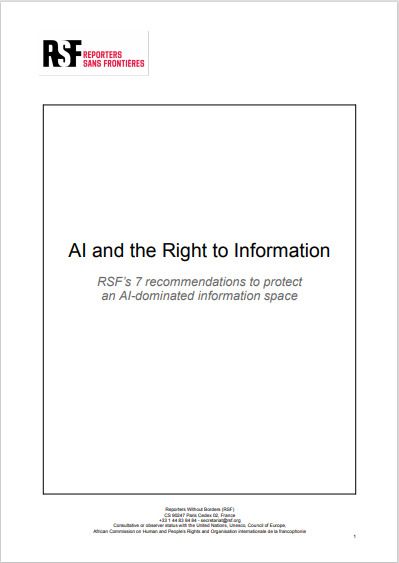
AI and the Right to Information - RSF's 7 recommendations to protect an AI-dominated information space
Reporters Without Borders (RSF), June 2024
With these recommendations stemming from various projects and initiatives by RSF targeting AI and information, RSF calls for comprehensive regulation targeting AI and the right to reliable information, strong public policies supporting reliable AI systems in the information ecosystem and reinforcing global democratic AI governance.
Go to resource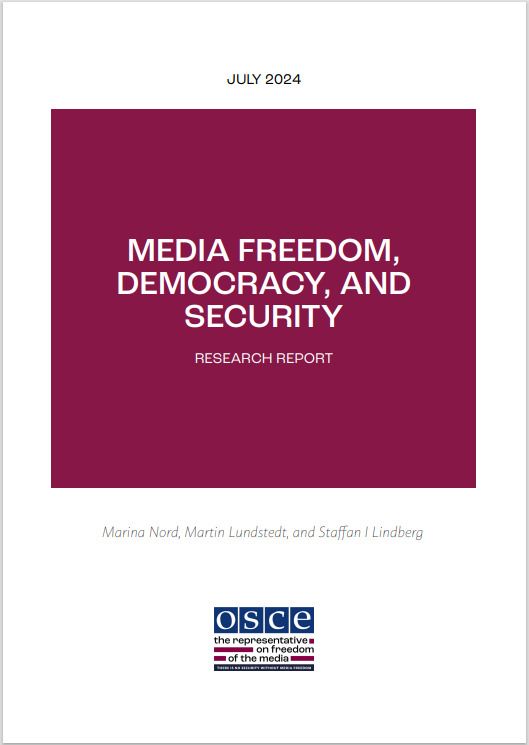
Media Freedom, Democracy and Security
Office of the OSCE Representative on Freedom of the Media, July 2024
As part of the OSCE project "No Security Without Media Freedom: FoM Dialogues", this report analyses the nexus between security, democracy and media freedom. Based on scientific evidence, it showcases that democracy improves domestic and international security, and how independent media is one mechanism through which it does so.
Go to resource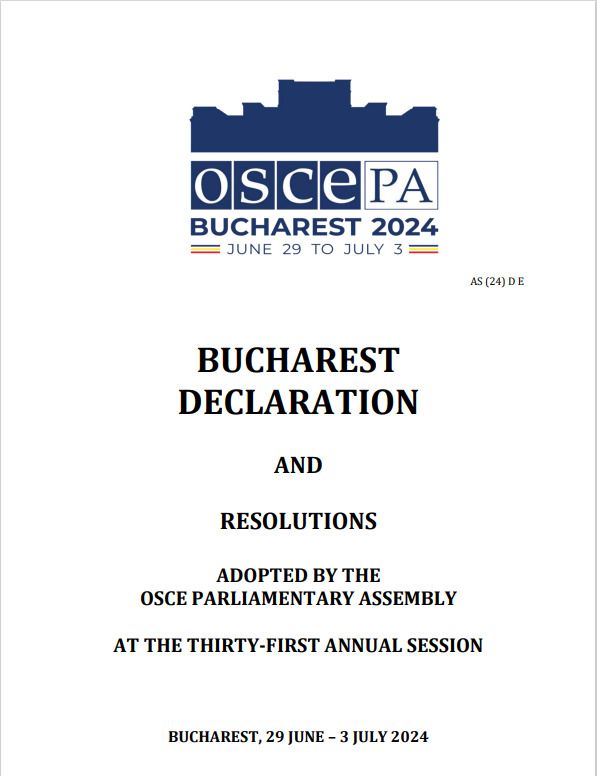
Bucharest Declaration and Resolutions adopted by the OSCE Parliamentary Assembly at the 31st Annual Session - Resolution on AI and the fight against terrorism
OSCE Parliamentary Assembly, July 2024
This resolution adopted by the OSCE Parliamentary Assembly stresses the impact of AI on various aspects of society, including international peace and security, and how it can be used to spread misinformation and conspiracy theories and lead to violent extremism and terrorism. The resolution encourages OSCE participating States to enact or strengthen existing legislation in order to prevent the misuse of AI by terrorists and violent extremists while ensuring the respect for human rights, fundamental freedoms, privacy rights and data protection standards in line with United Nations and EU standards.
Go to resource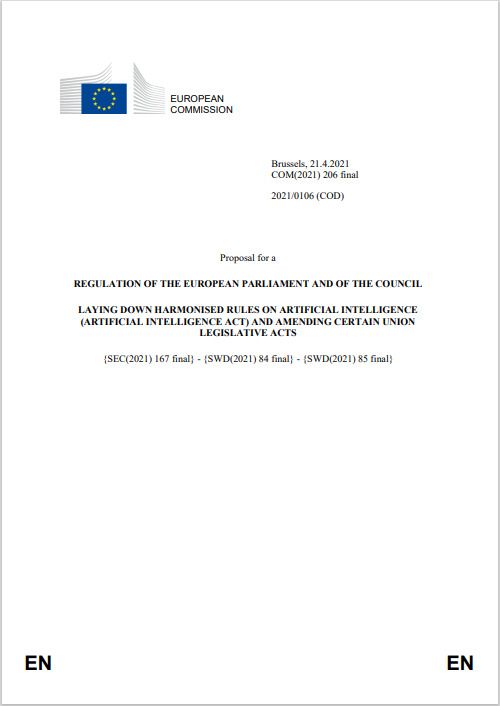
AI Act
European Union, August 2024
The AI Act is part of the European Union's digital strategy and aims at regulating AI to ensure better conditions for the development and use of this new technology. This is the first European regulatory framework for AI, and it analyses and classifies different AI systems according to the risk they pose to users.
Go to resource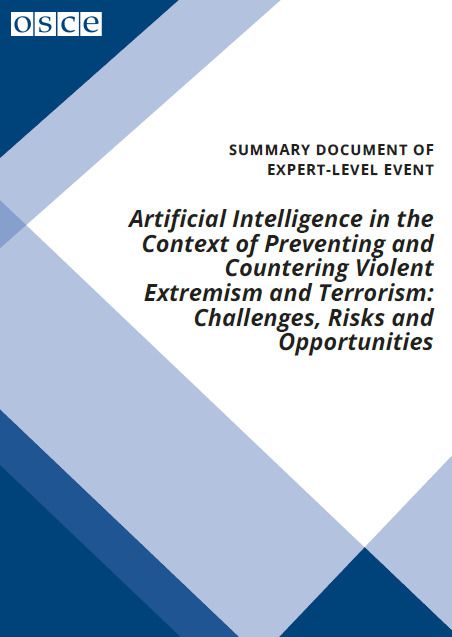
Artificial Intelligence in the Context of Preventing and Countering Violent Extremism and Terrorism - Challenges, Risks and Opportunities
OSCE, September 2024
This report is the outcome of the seminar co-organised by the OSCE and the ICCT focusing on the potential exploitation of AI by terrorist and extremist groups. It encapsulates key discussion points and provides recommendations.
Go to resource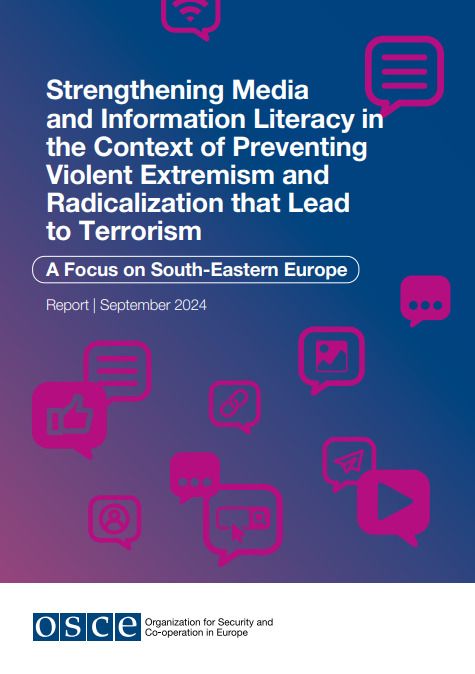
Strengthening Media and Information Literacy on the Context of Preventing Violent Extremism and Radicalization that Lead to Terrorism: A Focus on South-Eastern Europe
OSCE, September 2024
The OSCE Secretariat and field operations in South-Eastern Europe have conducted an extensive work on media- and information literacy, as well as on preventing/countering violent extremism and radicalization leading to terrorism in the region. This report highlights the multi-faceted challenges posed by disinformation (such as polarization, and threats to democracy) and analyses how they are impacting South-Eastern Europe.
Go to resource
Eternal You - AI, digital immortality, and information integrity
Office of the OSCE Representative on Freedom of the Media, September 2024
The Office of the RFoM organized a screening of the documentary film Eternal You together with the Austrian Federal Ministry of European and International Affairs. The screening was followed by a panel discussion on the rise of AI-driven impersonation and how these technologies blur the lines between reality and hallucination, between fact and fiction, as well as their legal, human rights and ethical implications. This one pager summarises the main take-aways of the panel discussion.
Go to resource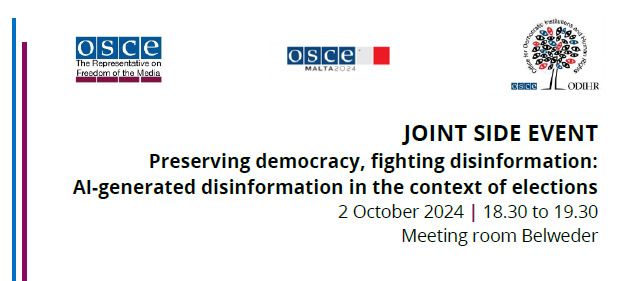
Preserving democracy, fighting disinformation: AI-generated disinformation in the context of elections
Office of the Representative on Freedom of the Media, Office for Democractic Institutions and Human Rights and the OSCE Chaipersonship of Malta, October 2024
The Office of the Representative on Freedom on the Media, together with the OSCE CiO and ODIHR, organized a side-event during the Warsaw Human Dimension Conference on AI-generated disinformation in times of elections. The aim of this event was to discuss major global challenges to democracy and security, and to present possible ways forward to address the risks related to AI-generated and AI-facilitated disinformation in a collaborative and crosscutting manner.
Go to resource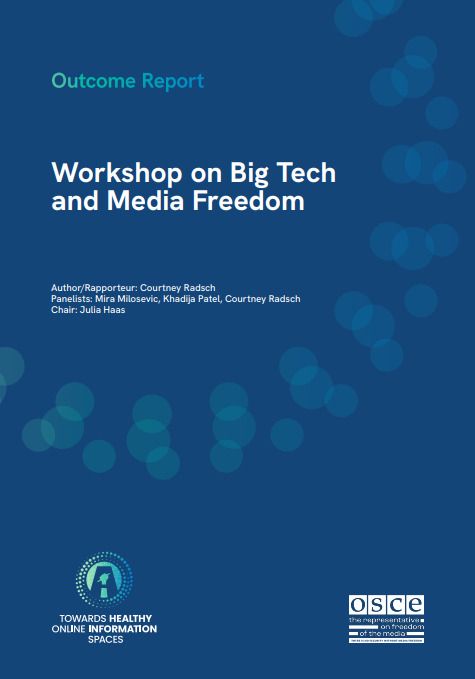
Workshop on Big Tech and Media Freedom, Outcome Report
Office of the OSCE Representative on Freedom of the Media, October 2024
This report is the outcome of a closed expert workshop on Big Tech and Media Freedom, which was organized by the Office of the RFoM during the 2024 World Congress of the International Press Institute (IPI) in Sarajevo. Participants examined the role of Big Tech platforms which monopolize internet search services, social media, and digital advertising. This report explores the impact of Big Tech and emerging technologies on media dependencies and how these undermine democracy. It explores ways forward to ensure a sustainable public interest media ecosystem.
Go to resource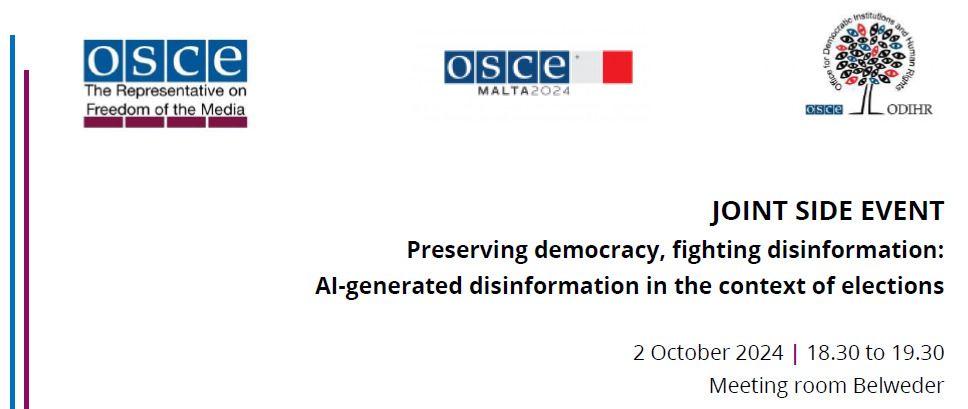
Outcome report of the joint side-event organized at the Warsaw Human Dimension Conference: Preserving democracy, fighting disinformation: AI-generated disinformation in the context of elections
Office of the Representative on Freedom of the Media, Office for Democractic Institutions and Human Rights and the OSCE Chaipersonship of Malta, October 2024
The Office of the Representative on Freedom on the Media, together with the OSCE CiO and ODIHR, organized a side-event during the Warsaw Human Dimension Conference on AI-generated disinformation in times of elections. The aim of this event was to discuss major global challenges to democracy and security, and to present possible ways forward to address the risks related to AI-generated and AI-facilitated disinformation in a collaborative and crosscutting manner. This short report summarises the main take-aways of the panel discussions.
Go to resource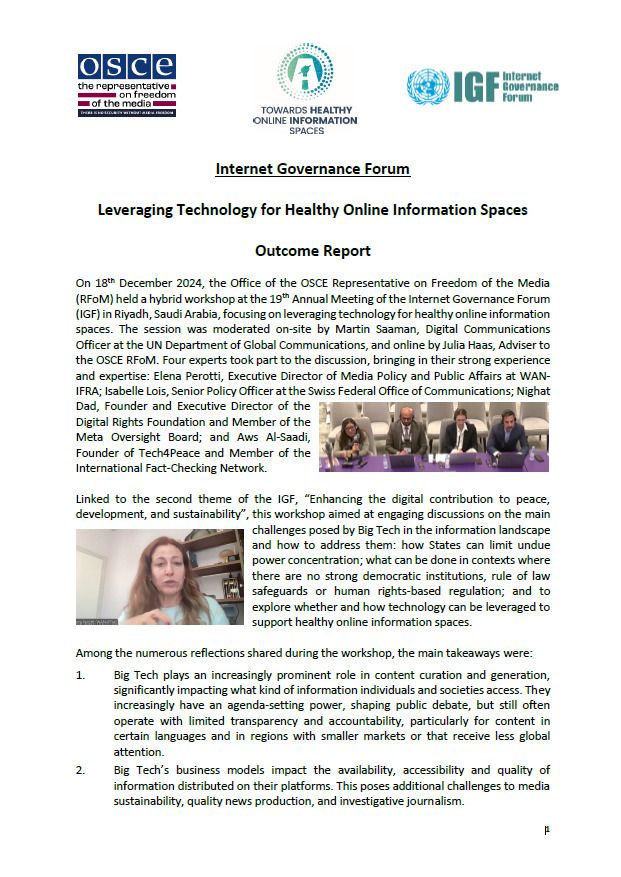
IGF 2024 - Workshop on Leveraging Technology for Healthy Online Information Spaces - Outcome Report
Office of the Representative on Freedom of the Media, December 2024
The Office of the Representative on Freedom of the Media organized a panel discussion at the 19th Internet Governance Forum (IGF) on 'Leveraging Technology for Healthy Online Information Spaces'. This session aimed at engaging discussions on the main challenges posed by Big Tech in the information landscape and how to address them. This short outcome report summarises the main takeaways and the main action points discussed by the panelists.
Go to resource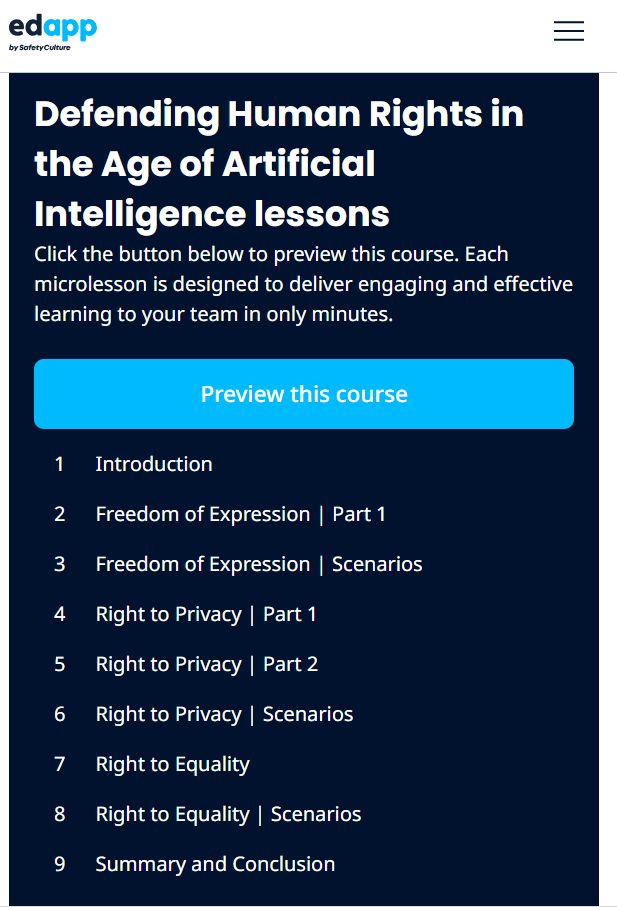
Defending Human Rights in the Age of Artificial Intelligence
UNESCO and United Nations Institute for Training and Research (UNITAR)
A nine-unit interactive course for youth on AI and Human Rights developed jointly by UNESCO and United Nations Institute for Training and Research (UNITAR). This course breaks down complex concepts on how freedom of expression, the right to privacy, and the right to equality are affected using AI.
Go to resource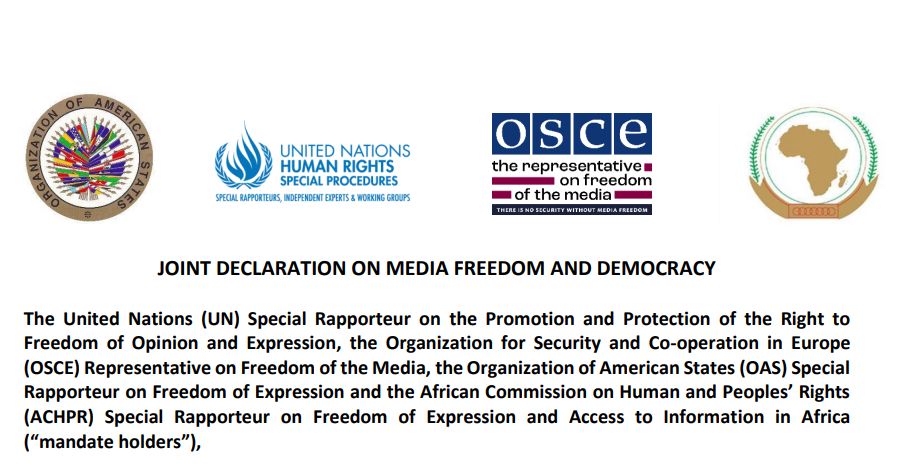
Joint Declaration on Media Freedom and Democracy
May 2023
Joint Declaration on the role of media freedom in creating and sustaining democratic societies by the UN Special Rapporteur on Freedom of Opinion and Expression, the OSCE Representative on Freedom of the Media, the OAS Special Rapporteur on Freedom of Expression and the ACHPR Special Rapporteur on Freedom of Expression and Access to Information.
Go to resource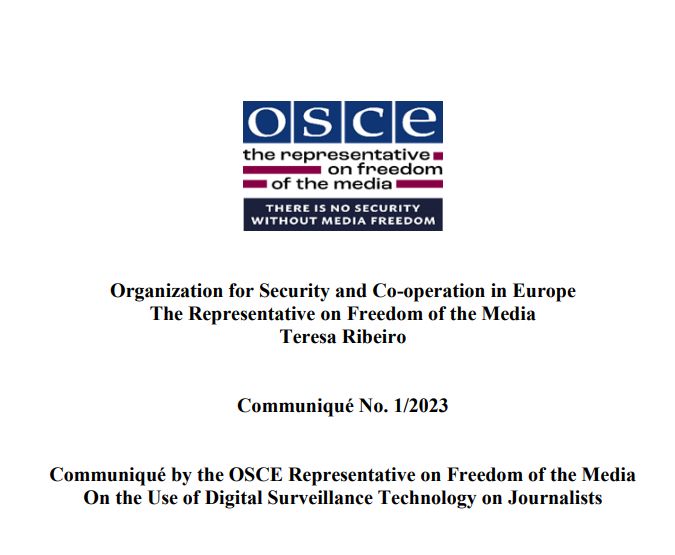
Communiqué by the OSCE Representative on Freedom of the Media on the Use of Digital Surveillance Technology on Journalists
Office of the OSCE Representative on Freedom of the Media, September 2023
In this communiqué on the use of digital surveillance technology on journalists, the RFoM underscores the significant negative impact such technology can have on media freedom and urges against their use on journalists.
Go to resource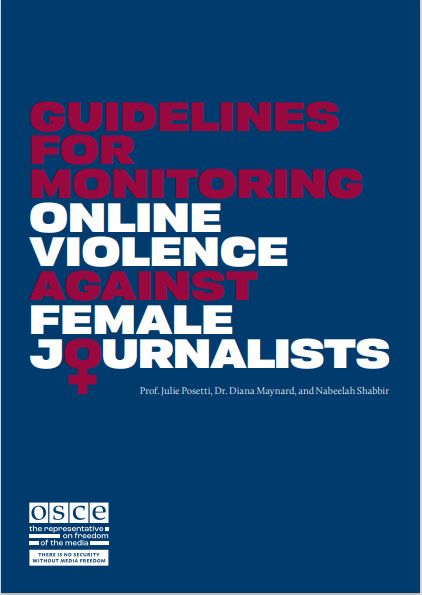
Guidelines for Monitoring Online Violence Against Female Journalists
Office of the OSCE Representative on Freedom of the Media, October 2023
These guidelines provide practical directions and insightful strategies to monitor, analyse and report cases of online violence faced by female journalists, and its potential escalation to offline violence.
Go to resource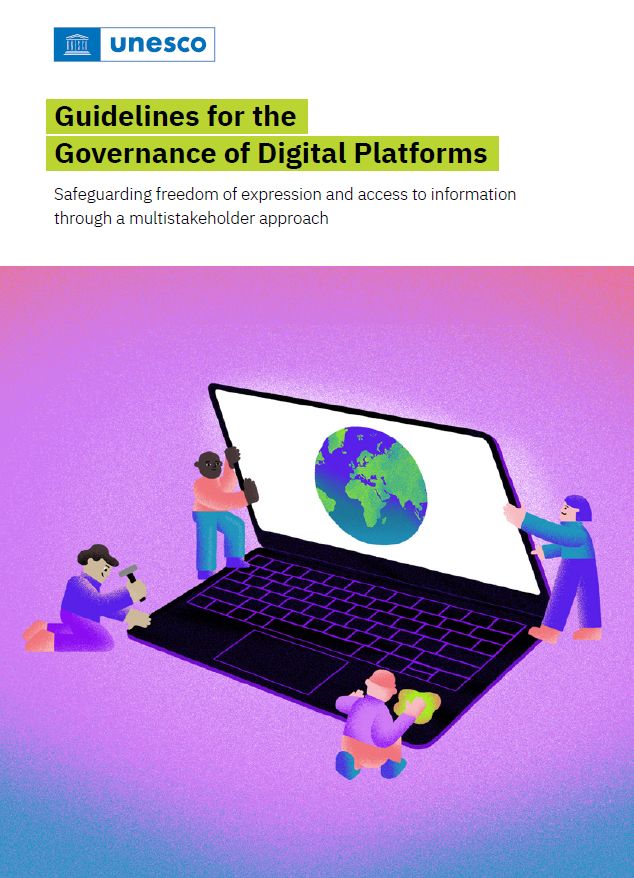
UNESCO Guidelines for the Governance of Digital Platforms
UNESCO, November 2023
UNESCO developed Guidelines that aim to safeguarding freedom of expression and access to information online in the context of the development and implementation of digital platform regulatory processes.
Go to resource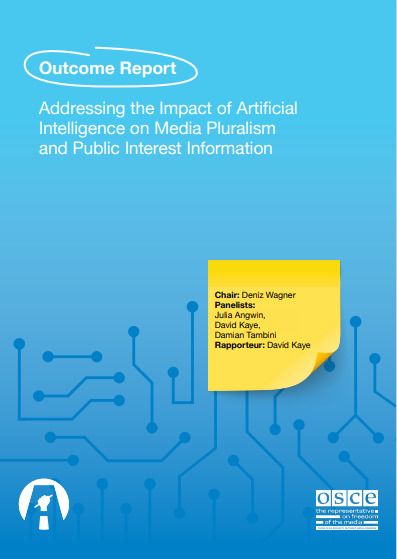
Addressing the Impact of Artificial Intelligence on Media Pluralism and Public Interest Information
Office of the OSCE Representative on Freedom of the Media, November 2023
This outcome report follows a workshop on the impact of AI on media pluralism and public interest information organized by the Office of the OSCE Representative on Freedom of the Media at the 2023 International Press Institute World Congress. Authored by David Kaye, the report presents the key issues and challenges discussed during the event, and provides recommendations for States and other stakeholders.
Go to resource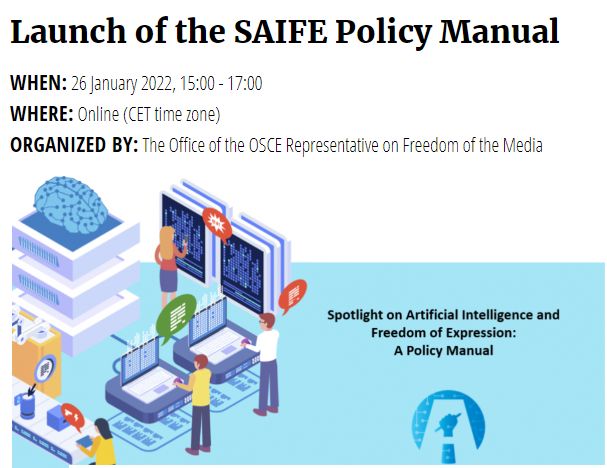
Video Launch: the SAIFE Policy Manual
Office of the OSCE Representative on Freedom of the Media, January 2022
A livestream event featuring the launch of the SAIFE Policy Manual, the culmination of two years of research and several expert workshops, bringing together more than 120 experts from various backgrounds and across the OSCE region. The SAIFE Policy Manual provides human rights-centric recommendations to safeguard freedom of expression in the use of AI in content moderation and curation.
Go to resource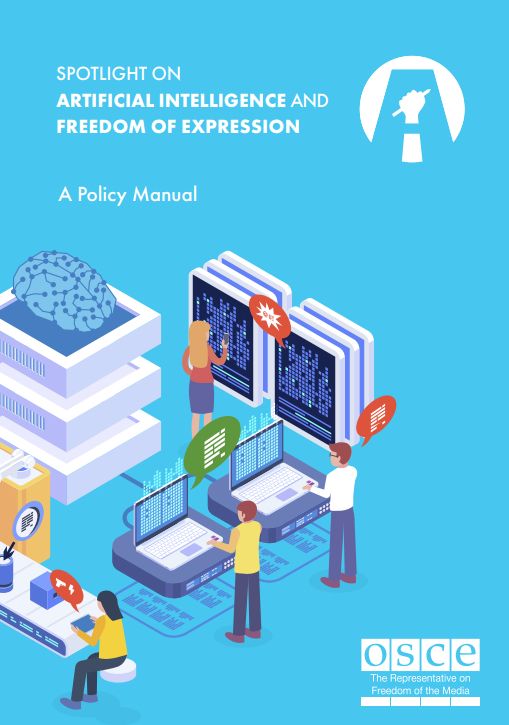
SAIFE Policy Manual
Office of the OSCE Representative on Freedom of the Media, January 2022
The SAIFE Policy Manual is the culmination of two years of research and several expert workshops, bringing together more than 120 experts from various backgrounds and across the OSCE region and provides human rights-centric recommendations to safeguard freedom of expression in the use of AI in content moderation and curation.
Go to resource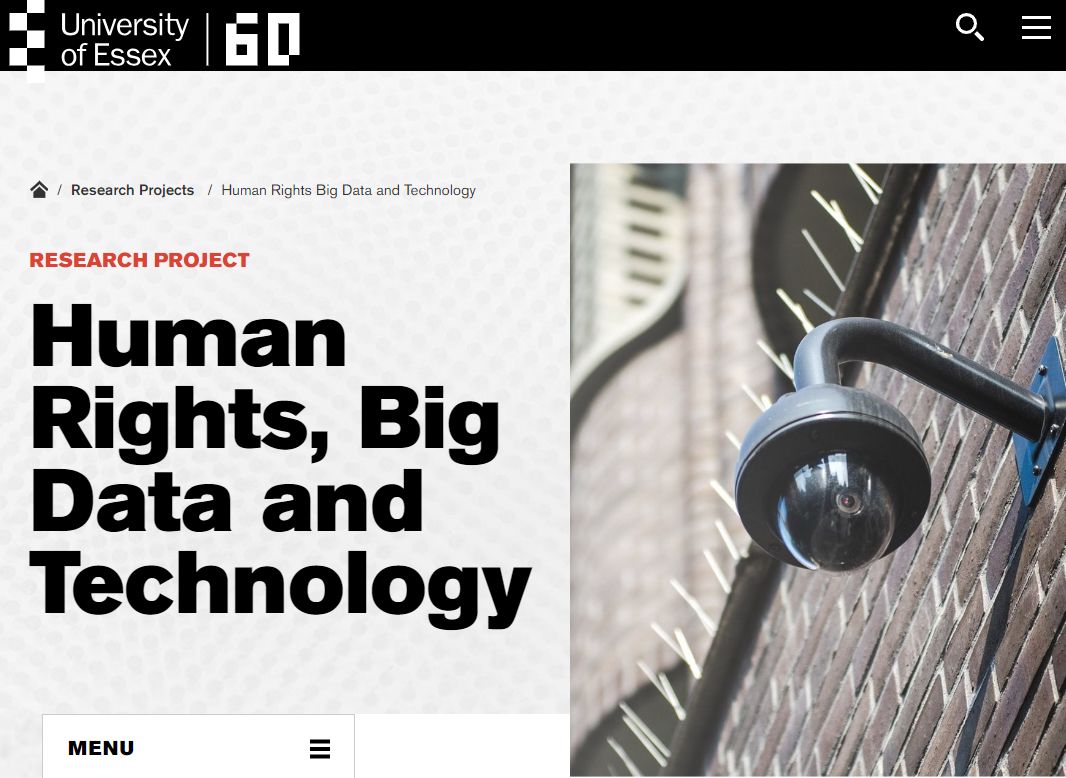
How AI can affect human rights
Essex University’s Human Rights Centre, 2015-2022
This video, produced by Essex University’s Human Rights Centre, presents the human rights challenges posed by surveillance capitalism and the mass collection and processing of personal data.
Go to resource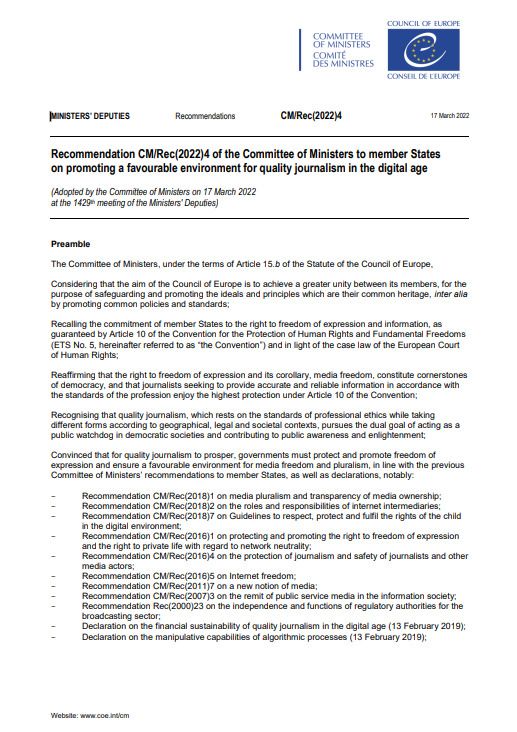
Recommendation CM/Rec (2022)4 of the Committee of Ministers to member States on promoting a favourable environment for quality journalism in the digital age
Council of Europe, March 2022
The recommendation presents guidelines to Council of Europe member States on promoting quality journalism in the digital age. It recalls the importance of quality journalism in all sectors of society, for strong and stable democracies, and how the rapid technological development has profoundly disrupted the news business in general and resulted in a rise of new challenges for quality journalism. The guidelines are designed to stimulate and reinforce independent, accurate and reliable quality journalism, committed to the pursuit of truth and to the need to minimise harm, as a pillar for the functioning of democracies.
Go to resource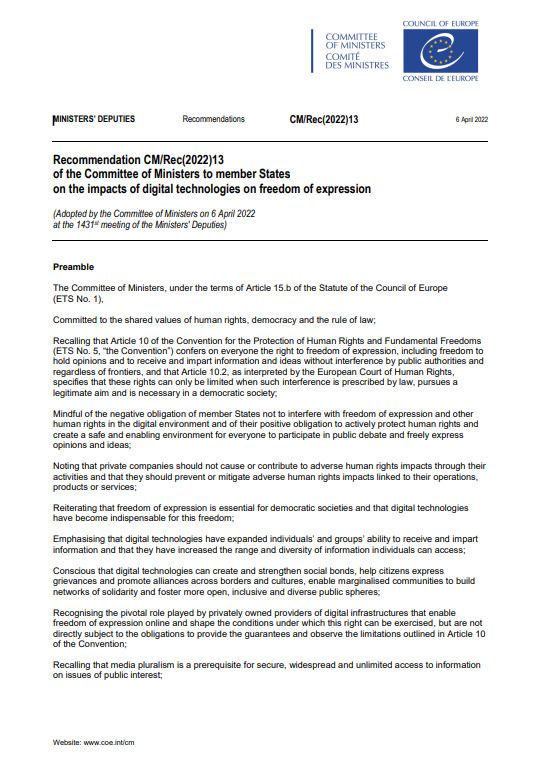
Recommendation CM/Rec (2022)13 of the Committee of Ministers to member States on the impacts of digital technologies on freedom of expression
Council of Europe, April 2022
Following the Recommendation CM/Rec (2022)4 on quality journalism in the digital age, this document presents guidelines to assist States, public and private actors, in particular internet intermediaries, as well as the media, civil society organisations, researchers and other relevant actors in their independent and collaborative efforts to protect and promote freedom of expression in the digital age. Aim of these guidelines is to ensure that digital technologies serve rather than curtail such freedom. They also provide recommendations on how to reduce the adverse impacts and enhance the positive impacts of the widespread use of digital technologies on freedom of expression in human rights-compliant ways.
Go to resource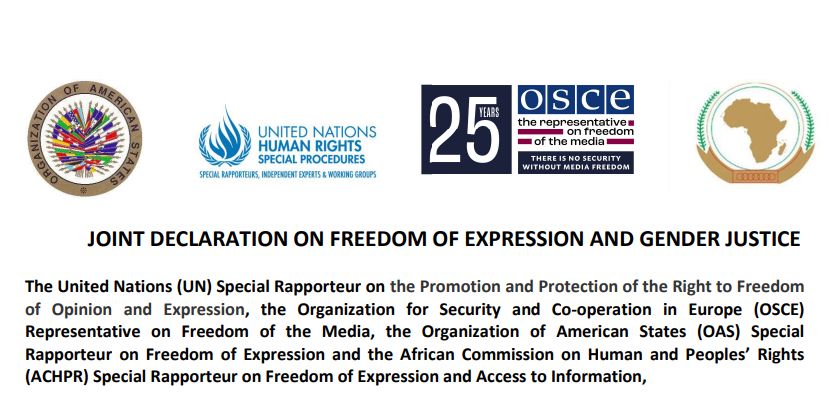
Joint Declaration on Freedom of Expression and Gender Justice.
May 2022
Joint Declaration on transformative changes for gender justice in freedom of expression, including in the digital context, by the UN Special Rapporteur on Freedom of Opinion and Expression, the OSCE Representative on Freedom of the Media, the OAS Special Rapporteur on Freedom of Expression and the ACHPR Special Rapporteur on Freedom of Expression and Access to Information.
Go to resource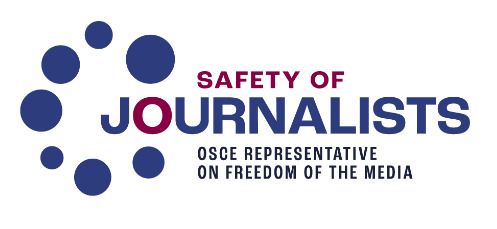
OSCE RFoM Safety of Journalists Toolbox
Office of the OSCE Representative on Freedom of the Media, May 2022
This Toolbox presents national instruments and initiatives from across the OSCE region, showcasing existing measures on the safety of journalists, and making them accessible to interested stakeholders. It includes the topic of 'digital safety', addressing cyber violence, spyware as well as the role of platforms and social media in the distribution of content.
Go to resource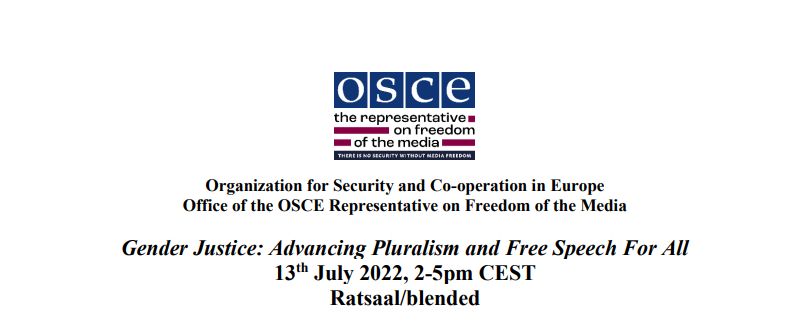
Event on Gender Justice: Advancing Pluralism and Free Speech For All
Organized by the OSCE Representative on Freedom of the Media, July 2022
The event discusses transformative change to remove systemic inequalities, barriers and discrimination in view of achieving gender justice and an enabling environment for pluralism and freedom of expression for all, and launches policy papers focusing on online rape threats, digital security hazards and targeted disinformation from the perspective of the (mis-)use of technology and automated systems to disempower women’s exercise of freedom of expression.
Go to resource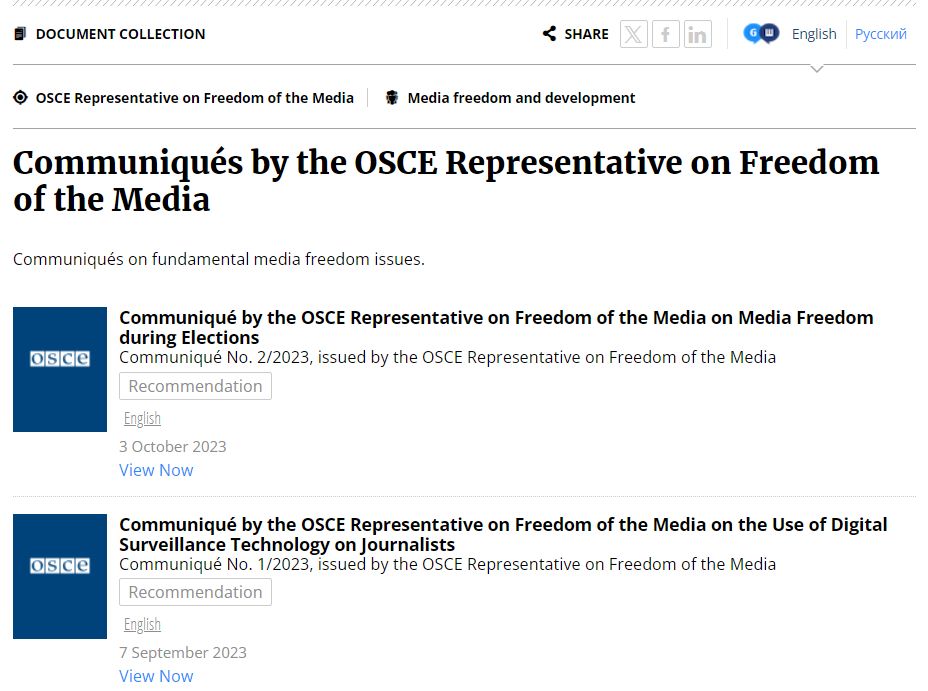
Communiqués by the OSCE Representative on Freedom of the Media
Organized by the OSCE Representative on Freedom of the Media, July 2022
A collection of communiqués on fundamental media freedom issues.
Go to resource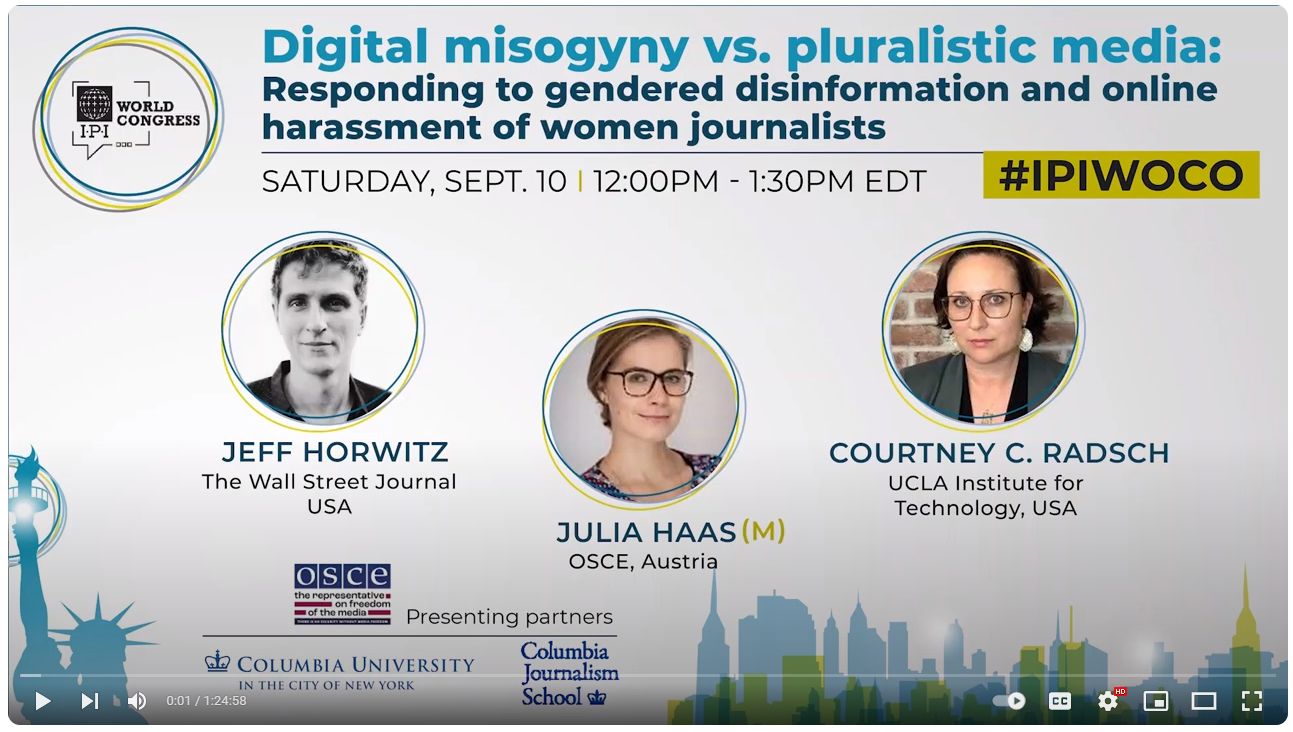
Digital misogyny vs. pluralistic media: Responding to gendered disinformation and online harassment of women journalists
organized by the OSCE Representative on Freedom of the Media and International Press Institute (IPI) at the 2022 IPI World Congress, September 2022
Recording of a workshop on steps to address gendered disinformation and violence against journalists and its detrimental impact on media pluralism and information spaces. It explored types and methods of gendered disinformation and online violence, discussed strategies to prevent and combat smear campaigns, and identifed the role of different stakeholders to address gendered violence against journalists. In particular, the workshop explored what international organizations such as the OSCE can and should be doing to better to support journalists and hold states to their commitments on safety of journalists, pluralism and media freedom.
Go to resource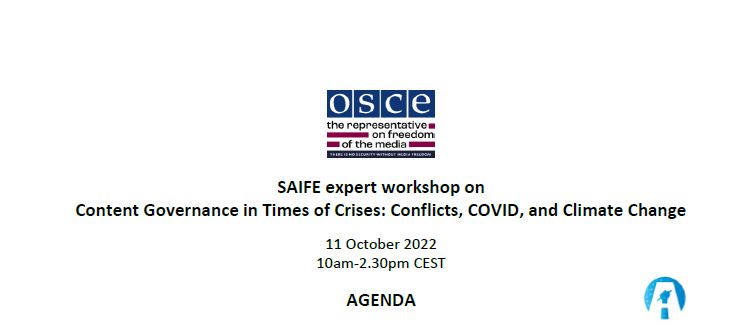
SAIFE expert workshop on content governance in times of crisis
Agenda, Concept Note, Miro Boards – October 2022
This SAIFE workshop explored the specific crisis-context of platform and content governance, building on the SAIFE Policy Manual and exploring implications and experiences in the context of the COVID-19 pandemic, conflicts, and the climate crisis.
Go to resource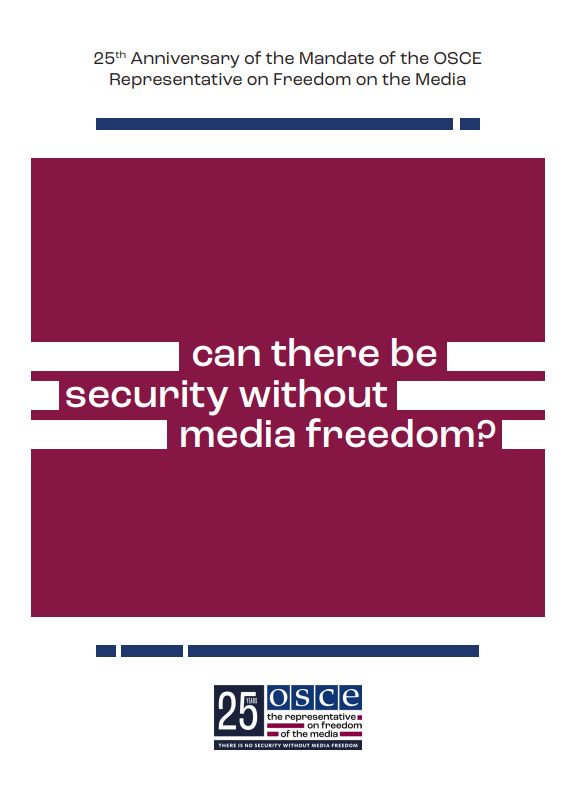
Can there be security without media freedom? - Report on the occasion of the 25th Anniversary of the Mandate of the OSCE Representative on Freedom of the Media
OSCE Representative on Freedom of the Media, November 2022
On the occasion of the 25th anniversary of the mandate of the OSCE Representative on Freedom of the Media, the RFoM established an Advisory Group of Eminent Experts on Freedom of the Media to take a birds-eye view on the media freedom situation and its linkage to security. This report highlights the expert discussions on current and emerging trends and challenges for media freedom – including in the digital realm, and the potential role of the RFoM in addressing these issues.
Go to resource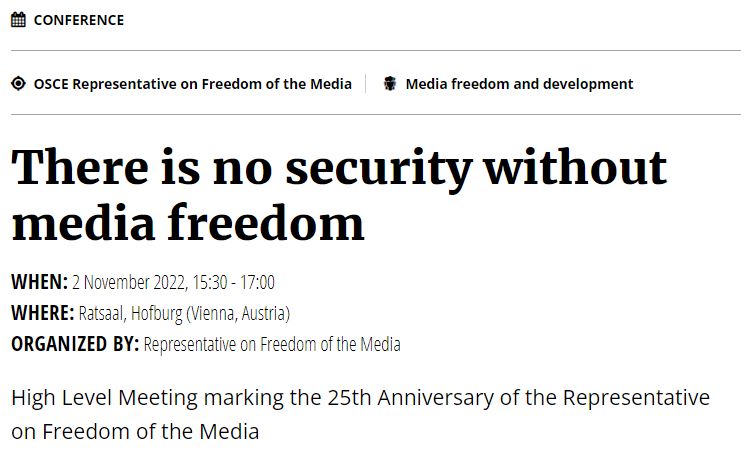
There is no security without media freedom: 25th anniversary of the RFoM mandate
Organized by the OSCE Representative on Freedom of the Media, November 2022
This event commemorates the 25th anniversary of the mandate of the OSCE Representative on Freedom of the Media and presents the report “Can there be security without media freedom?” based on the discussions that the members of the Advisory Group Eminent Experts on Freedom of the Media (AGEEFOM).
Go to resource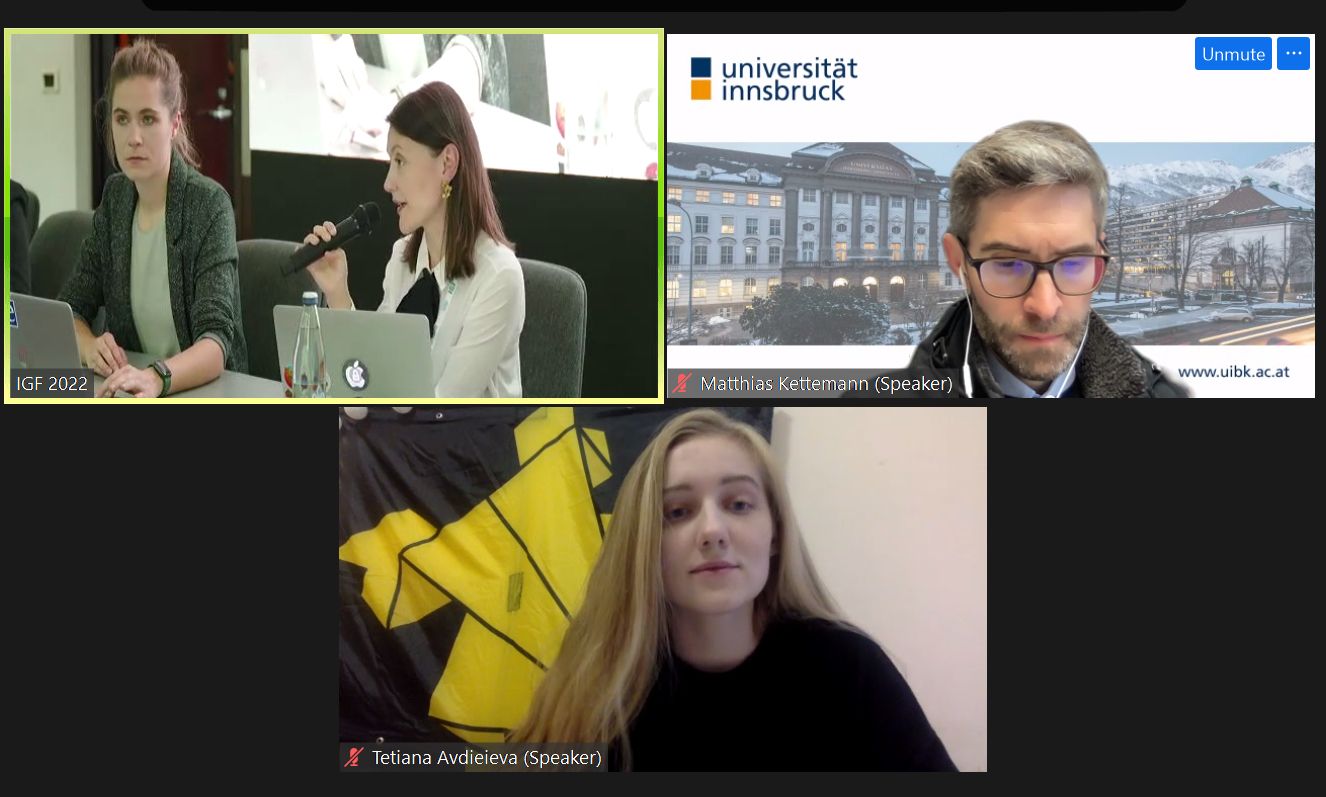
Spotlight on AI-driven Content Governance in Times of Crisis
organized by the OSCE Representative on Freedom of the Media at the 2022 Internet Governance Forum, November 2022
Recording of the SAUFE session at the 2022 Internet Governance Forum. In early 2022, the OSCE RFoM provided general guidance to states, on regulation of AI in order to protect freedom of expression and other human rights, as well as media pluralism. This session explored their explored its applicability in times of crises, to ensure there are no trade-offs to human rights. During the session, preliminary research and workshop outcomes on this were presented and key findings discussed to provide concrete recommendations on protecting freedom of expression and other human rights in the use of AI for content governance in times of crises.
Go to resource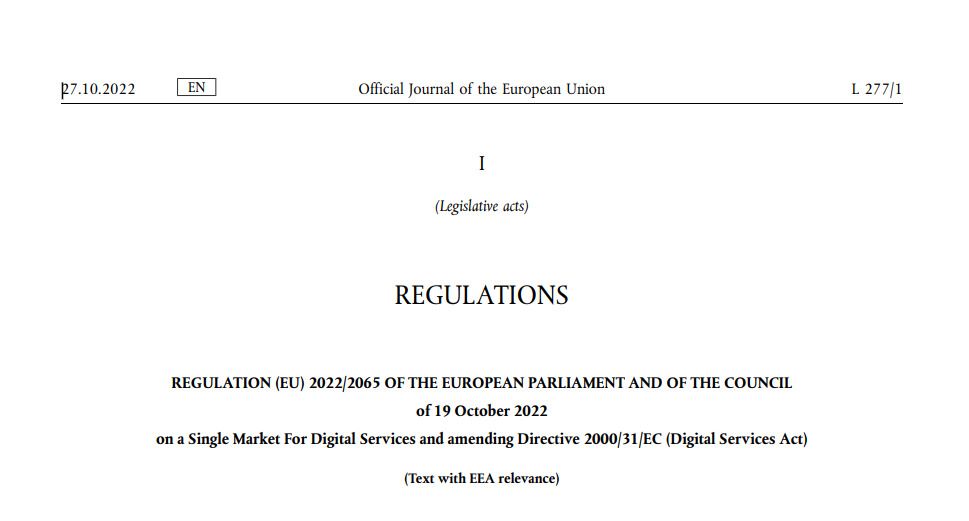
Digital Services Act
European Union, November 2022
The DSA is an EU regulation adopted in 2022 aiming at "contributing to the proper functioning of the internal market for intermediary services by setting out harmonised rules for a safe, predictable and trusted online environment that facilitates innovation and in which fundamental rights [...] are effectively protected" (Art.1). Its main goal is to prevent illegal and harmful activities online and the spread of disinformation. It ensures user safety, protects fundamental rights, and creates a fair and open online platform environment.
Go to resource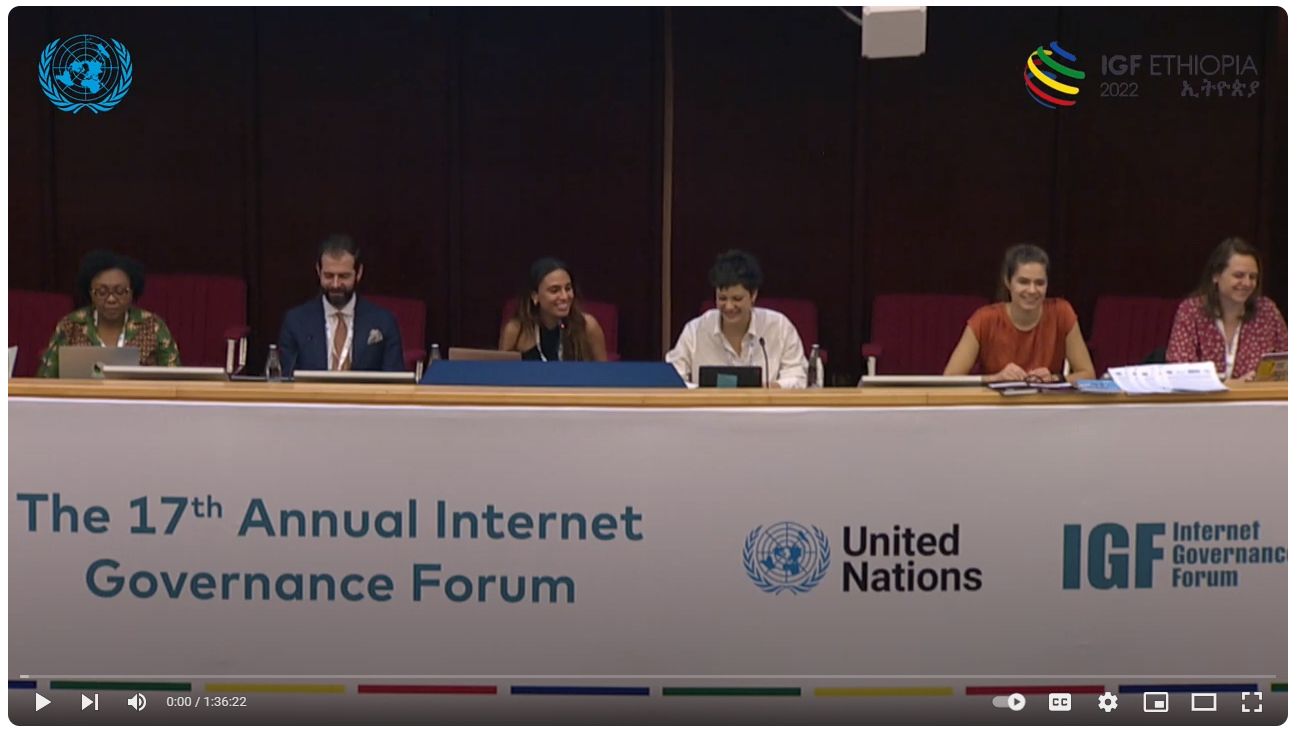
Gender and Digital Rights: IGF Best Practice Forum
organized by the OSCE Representative on Freedom of the Media at the 2022 Internet Governance Forum, December2022
Recording of a session at the 2022 Internet Governance Forum, addressing the main subjects of the Best Practice Forum on Gender and Digital Rights: a) Reproductive privacy; (b) Freedom of expression / Gendered disinformation; and (c) Freedom of association and religion; in order to understand the thin lines between protective and user-oriented regulatory practices and authoritative language with possible restrictions to our digital rights.Human rights must be observed in all aspects of one’s life – personal and professional, online and offline.
Go to resource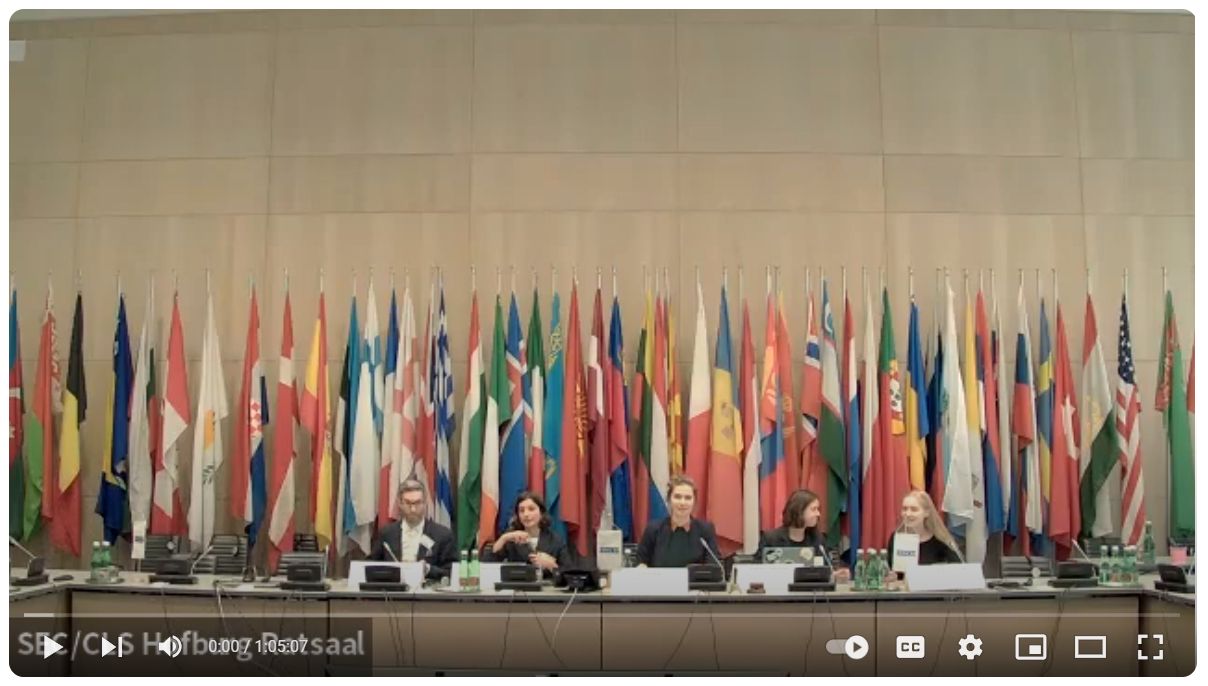
Content Governance in Times of Crisis
organized by the OSCE Representative on Freedom of the Media at the 2022 SAIFE Expedition, December2022
Building on the SAIFE Policy Manual and an earlier workshop held with civil society and academia, this panel aimed at increasing understanding of the specific challenges of content governance in crisis situations and at contextualizing existing recommendations on transparency, accountability, inclusiveness, and public oversight. The panel provided guidance to OSCE participating States on how to ensure free speech safeguards for automated content governance in the context of crises, be it conflict, climate change, or COVID.
Go to resource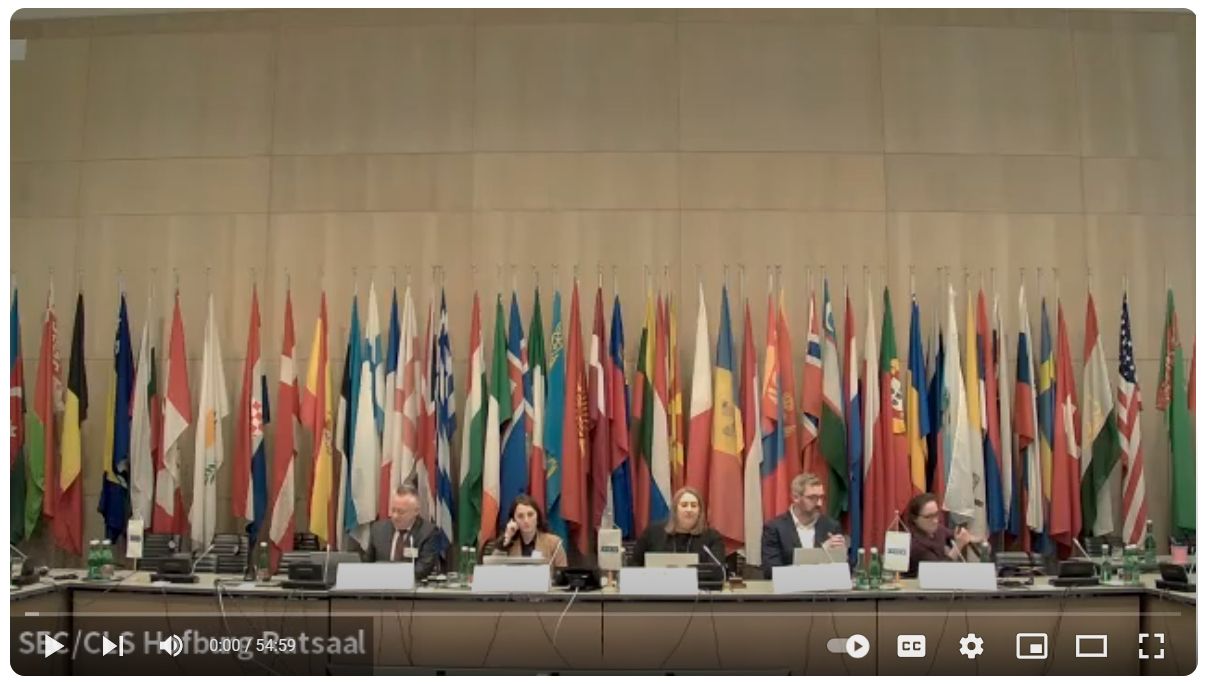
AI for a Public Interest Framework
organized by the OSCE Representative on Freedom of the Media at the 2022 SAIFE Expedition, December2022
This panel explored the opportunities of a “public interest framework” for the digital information landscape and content recommender systems that promote quality media and public interest information to address many of the media freedom challenges posed by AI-based content governance systems, as identified in the SAIFE Policy Manual. The panel deliberated key recommendations of the OSCE Advisory Group of Eminent Experts on Freedom of the Media regarding a digital public interest framework. This panel provided a starting point for further discussions on opportunities for a healthier and more vibrant online information space – conducive to democracy, sustainable development, and comprehensive security.
Go to resource
Better Human podcast
SAIFE Spotlight Initiative, Susie Alegre, January-March 2021
Human rights lawyer Susie Alegre joins the Better Human—a popular podcast hosted by UK barrister Adam Wagner—to lead a series of episodes that delve into an overlooked aspect of freedom of expression in the context of AI: freedom of opinion and freedom of information. Alegre invites experts from around the world to discuss the right to receive information and the ways in which AI affects what information we see and share. Featuring interviews with: Meetali Jain, Legal Director of Avaaz; Dr. Emma L. Briant, Maven of Persuasion; Professor Lorna Woods, University of Essex; Dr. Elif Mendos Kuskonmaz, University of Portsmouth; Brendan de Caires, Director of PEN Canada; and Professor Evelyn Aswad, University of Oklahoma.
Go to resource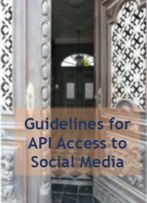
Guidelines for API Access to Social Media.
SAIFE Spotlight Initiative, Thomas Treml, Rania Wazir and Armin Rabitsch, January 2021
This report by Thomas Treml, Rania Wazir, and Armin Rabitsch describes the procedures for obtaining access to the application programming interface (APIs) for Twitter and Facebook, to provide useful guidance for researchers and civil society seeking data when conducting research on social media trends.
Go to resource
Social media disinformation in the age of Covid
Better Human podcast, Episode 41. January 13, 2021
What is disinformation, how does it spread, and can it be stopped? Meetali Jain, Legal Director at Avaaz, joins host Susie Alegre, international human rights lawyer, to discuss how AI-driven tools power disinformation and other types of harmful digital content, and what can be done about it.
Go to resource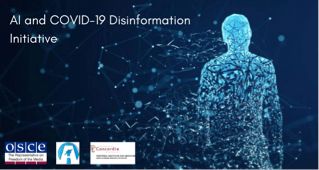
Interview series on AI and COVID-19 Disinformation
SAIFE Spotlight Initiative, Kyle Matthews, February-March 2021
This initiative in co-operation with Kyle Matthews, Executive Director of the Montreal Institute for Genocide and Human Rights Studies (MIGS) at Concordia University, explores the impact of AI in enabling and confronting COVID-19 related disinformation, as well as the intersection of AI in relation to digital threats that are taking advantage of the pandemic “infocalypse”. A series of interviews with renowned experts from different backgrounds explores policies on how AI can be harnessed and regulated to better counter online disinformation and guarantee freedom of expression, including in times of crises.
Go to resource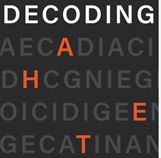
Decoding Hate podcast
SAIFE Spotlight Initiative, Katie Pentney, February 2021
A six-episode series that explores the connection between freedom of expression, artificial intelligence, and hate speech online. Human rights lawyer Katie Pentney discusses with leading experts what freedom of expression means in the digital age, the challenges of combating online hate speech, and the complexities of content moderation. Featuring discussions with: Nani Jansen Reventlow; Deniz Wagner; Tarlach McGonagle; Jillian York; Thiago Dias Oliva; Sahana Udupa; Molly Land; and Rikke Frank Jørgensen
Go to resource
AI Explanations
SAIFE Spotlight Initiative, Caroline Sinders and Bojana Kostic, February 2021
A feminist collective of digital rights researchers, design thinkers, artists, journalists and social media specialists explore questions how artificial intelligence shapes our realities, human rights, and access to justice and equality.
Go to resource
Who Should Decide What We See Online?
Jascha Galaski, Civil Liberties for Europe, February 2021
A report by Civil Liberties for Europe on how online platforms rank and moderate content, and advocating for regulatory responses that prioritize transparency and the protection of fundamental expression and privacy rights.
Go to resource
Are we truly free to express our opinions?
Better Human podcast, Episode 44. March 2, 2021
Evelyn Aswad, a professor at the University of Oklahoma College of Law, discusses freedom of opinion and how it interacts with freedom of speech.
Go to resource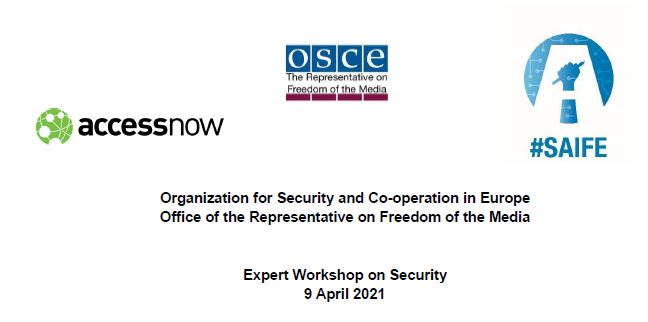
SAIFE expert working group on content moderation and security
Agenda, Concept Note, Miro Boards – April 2021
This SAIFE working group explored the free speech implication ofAI-based tools deployed in content moderation to detect and evaluate illegal content online, including security threats, such as extremist and terrorist content. It's outcome report fed into the SAIFE Policy Manual.
Go to resource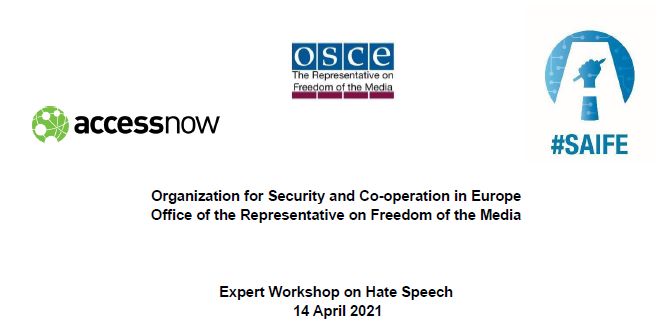
SAIFE expert working group on content moderation and hate speech
Agenda, Concept Note, Miro Boards – April 2021
This SAIFE working group explored the free speech implications of AI-based tools used for detecting and evaluating potentially harmful but legal content, with a specific focus on online hate speech and algorithmic discriminatory bias. It's outcome report fed into the SAIFE Policy Manual.
Go to resource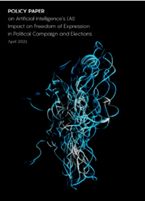
Policy paper on AI and freedom of expression in political competition and elections
SAIFE Spotlight Initiative, Election-Watch.EU, Vienna Data Science Group, April 2021
The policy paper developped by the Election-Watch.EU and the data4good Initiative of the Vienna Data Science Group (VDSG) addresses the impact of AI on freedom of expression in political campaigns and elections. Authors recommend human rights-based AI policies and regulatory measures that enable freedom of expression and the right to political participation.
Go to resource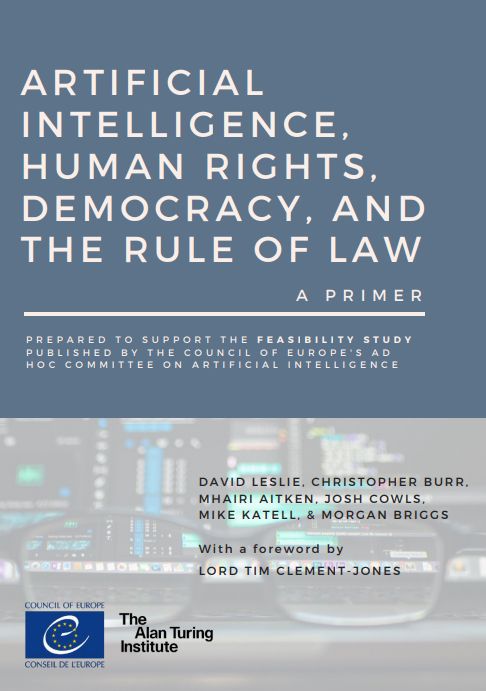
AI, human rights, democracy and the rule of law: A primer prepared for the Council of Europe
The Alan Turing Institute and the Council of Europe, April 2021
A primer by The Alan Turing Institute and the Council of Europe summarizing the main concepts presented in the Council of Europe’s Ad Hoc Committee on Artificial Intelligence (CAHAI) Feasibility Studyexploring the impact of AI on human rights and democracy.
Go to resource
Echo Chambers
A.I. Nation, Ep. 5. April 29, 2021
A.I. Nation, a podcast of Princeton University’s Center for Information Technology Policy and Philadelphia Public Radio station WHYY, examines the role of AI technologies in driving politically polarizing ideas in the U.S., discussing how such tools generate online echo chambers and fuel the virulent spread of disinformation and misinformation on social media.
Go to resource
Are algorithms making us less creative?
Better Human podcast, Episode 47. April 19, 2021
Do automatically curated news feeds help or hinder free expression? How does creativity interact with rights protections? A discussion with Brendan de Caires of PEN Canada, hosted by barristers Adam Wagner and Susie Alegre, about the impact of AI on writers.
Go to resource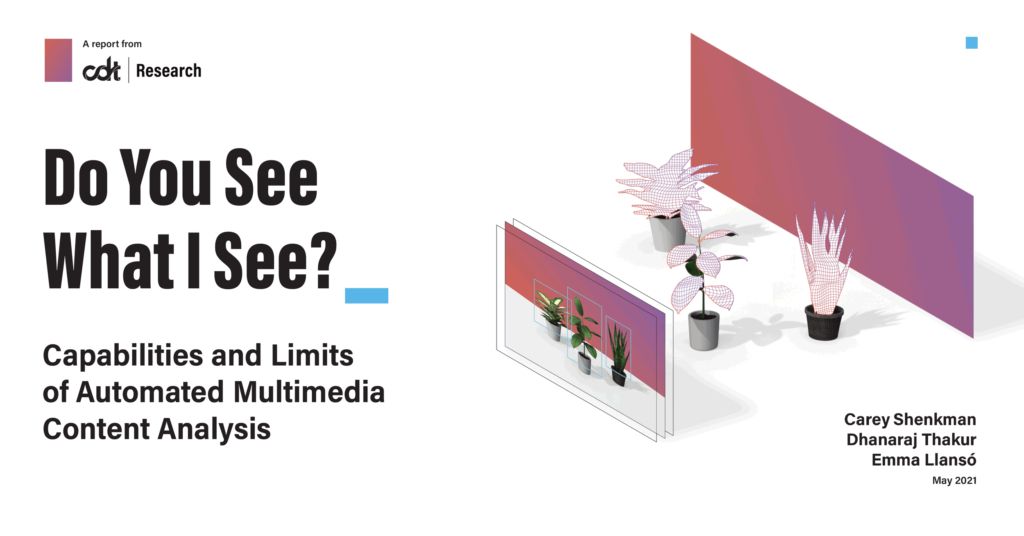
Do You See What I See? Capabilities and Limits of Automated Multimedia Content Analysis
Dhanaraj Thakur and Emma Llansó. Center for Democracy & Technology, May 2021
This paper by CDT explains the capabilities and limitation sof tools for analyzing online content, in particular multimedia content. It highlights the potential risks of using these tools at scale without accounting for their limitations.
Go to resource
AI for dummies
Civil Liberties for Europe, May 2021
This primer for non-tech audiences breaks down the fundamentals of AI and provides simple responses to questions such as: What is artificial intelligence? Why is it artificial?
Go to resource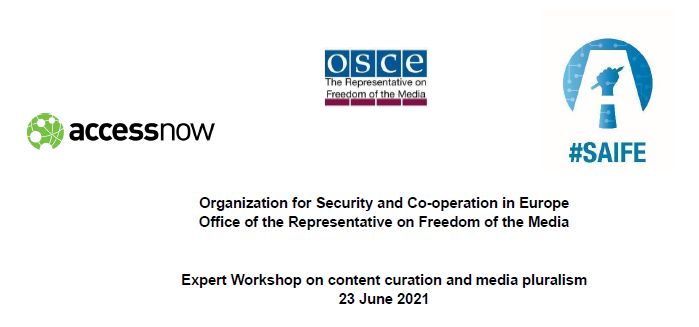
SAIFE expert working group on content curation and media pluralism
Agenda, Concept Note, Miro Boards – June 2021
This SAIFE working group explored the free speech implications of AI-based tools designed for curating and personalising online content, with a focus on content recommender systems and their impact on media pluralism. It's outcome report fed into the SAIFE Policy Manual.
Go to resource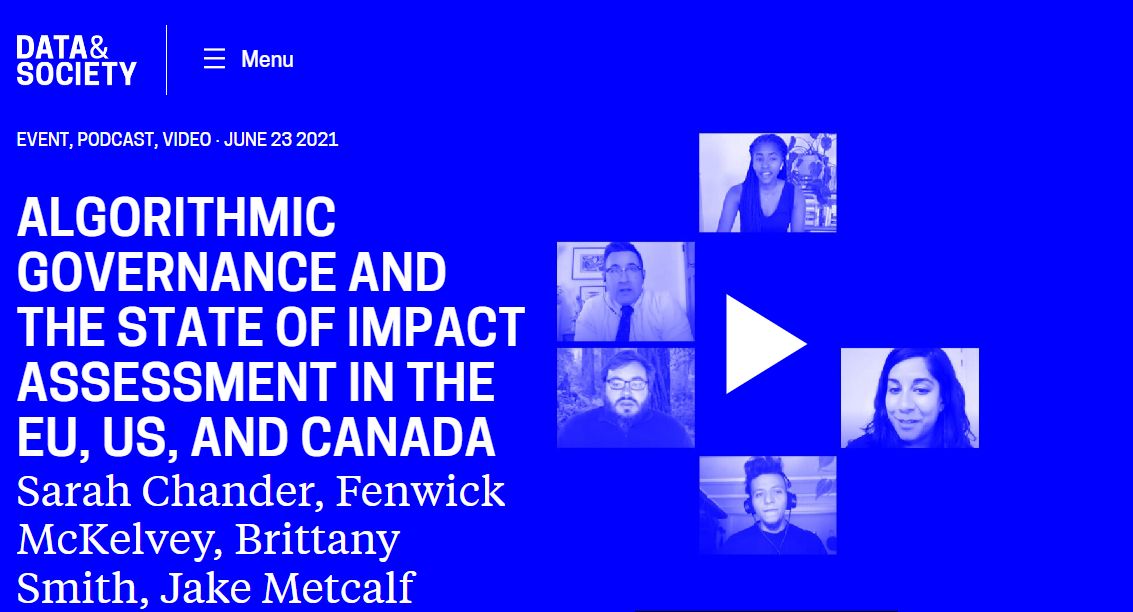
Algorithmic governance and the state of impact assessment in the EU, US, and Canada
Data & Society podcast. June 23, 2021
Data & Society Program Director Jacob Metcalf hosts a conversation with tech policy experts Sarah Chander, Fenwick McKelvey, Brittany Smith, and Jake Metcalf on the emerging AI regulations in the EU, U.S., and Canada, and asks how human rights impact assessments can help mitigate harms caused by algorithmic systems.
Go to resource
Serving you up on the internet
Better Human podcast, Episode 50. June 29, 2021
International human rights lawyer Susie Alegre hosts a discussion with Dr. Elif Kuskonmaz, a professor at the University of Portsmouth, about how tech companies have adopted deeply privacy-invasive surveillance and data-harvesting practices that are having profound implications for freedom of expression, access to information, and other human rights.
Go to resource
Are internet algorithms a problem for human rights?
Better Human podcast, Episode 49. June 9, 2021
A discussion with university professor Lorna Woods about how AI-driven technologies are shaping the digital content we see and access, and how this affects fundamental freedom of expression and privacy rights.
Go to resource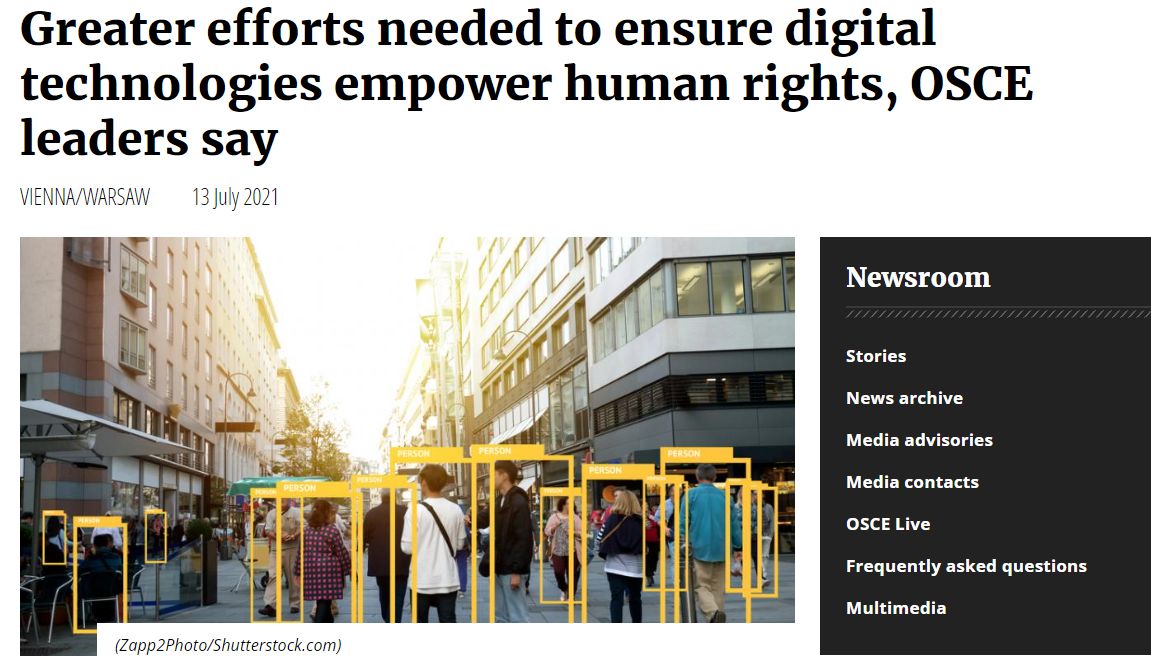
Press release: Greater efforts needed to ensure digital technologies empower human rights, OSCE leaders say
OSCE Office for Democratic Institutions and Human Rights, July 2021
Understanding the implications of digital technology is key to the protection and promotion of human rights in the 21st century, OSCE leaders said as a two-day online conference focused on the opportunities and challenges of the digital age for human rights and democracy.
Go to resource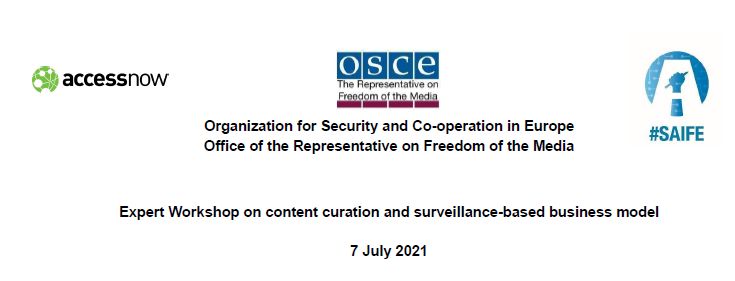
SAIFE expert working group on content curation and surveillance
Agenda, Concept Note, Miro Boards – July 2021
This SAIFE working group explored the free speech implications of AI-based tools used in surveillance-based advertisement and their link to curating content through profiling of individuals and predicting future behaviours. It's outcome report fed into the SAIFE Policy Manual.
Go to resource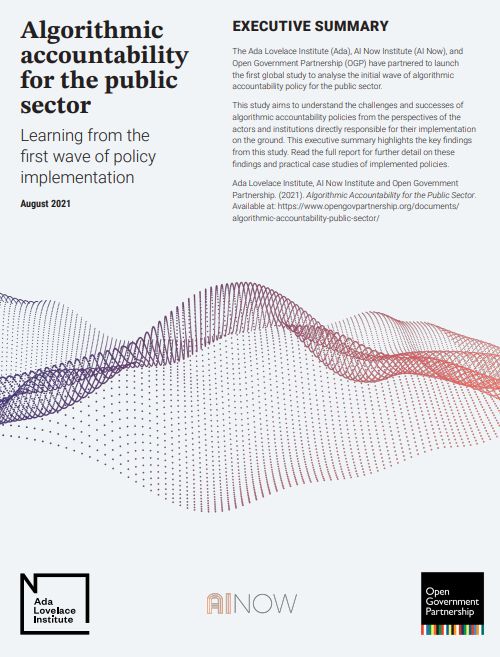
Algorithmic Accountability for the Public Sector
Ada Lovelace Institute, AI Now Institute, and Open Government Partnership, August 2021
A report mapping the challenges and successes of implementing algorithmic accountability policies, including practical case studies.
Go to resource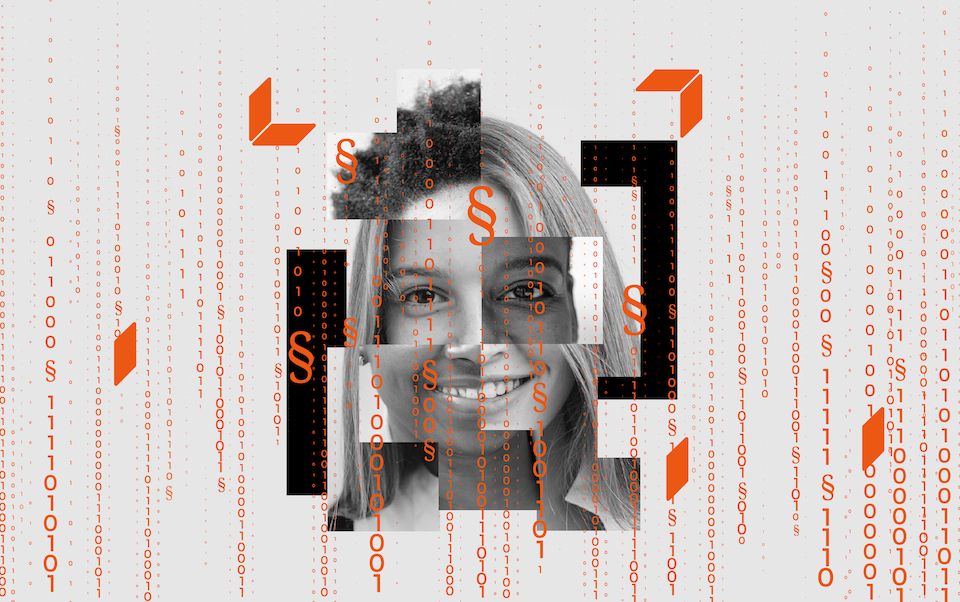
AI Regulation: Present Situation And Future Possibilities
Jascha Galaski, Civil Liberties for Europe, September 2021
The report by Civil Liberties for Europe addresses how the use of AI systems by public authorities and companies can have a significant impact on our lives—and calls for regulatory solutions that ensure these technologies do not enable manipulation or promote bias.
Go to resourceHow Business Models Have Shaped Big Tech
The World as You'll Know It podcast, Season 02, Episode 03. September 7, 2021
Host of The World As You’ll Know It podcast Kurt Andersen speaks with Roger McNamee, author of Zucked: Waking Up to the Facebook Catastrophe (2019), about the evolution of Facebook and other Big Tech companies and what measures might be taken to curb their influence.
Go to resource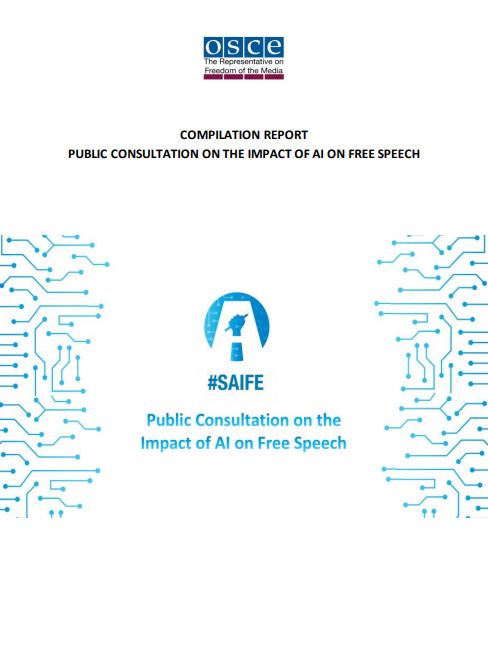
Compilation report of the public online consultation on AI and free speech
Office of the OSCE Representative on Freedom of the Media, 2021
In this report, the OSCE Representative on Freedom of the Media presents outcomes of an online public consultation conducted in 2020 to collect views, input, and feedback on the topic of AI and freedom of expression, and preliminary recommendations presented in the SAIFE Strategy Paper. This report outlines responses to survey questions and identifies emerging trends from responses received.
Go to resource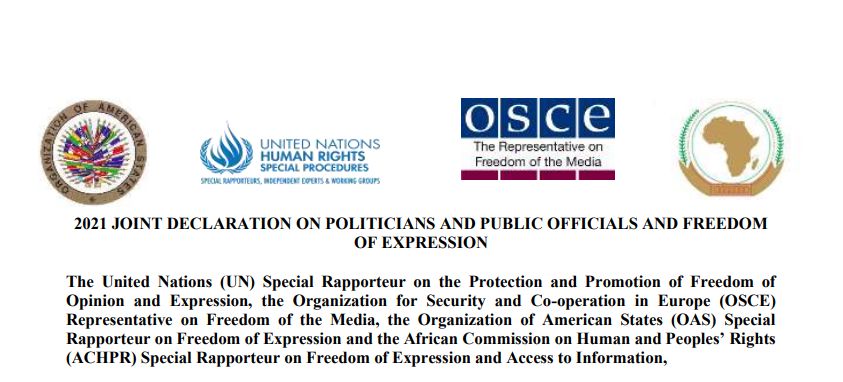
Joint Declaration on Politicians and Public Officials and Freedom of Expression.
October 2021
Joint Declaration focusing on political speech and speech by politicians and public officials by the UN Special Rapporteur on Freedom of Opinion and Expression, the OSCE Representative on Freedom of the Media, the OAS Special Rapporteur on Freedom of Expression, and the ACHPR Special Rapporteur on Freedom of Expression and Access to Information.
Go to resource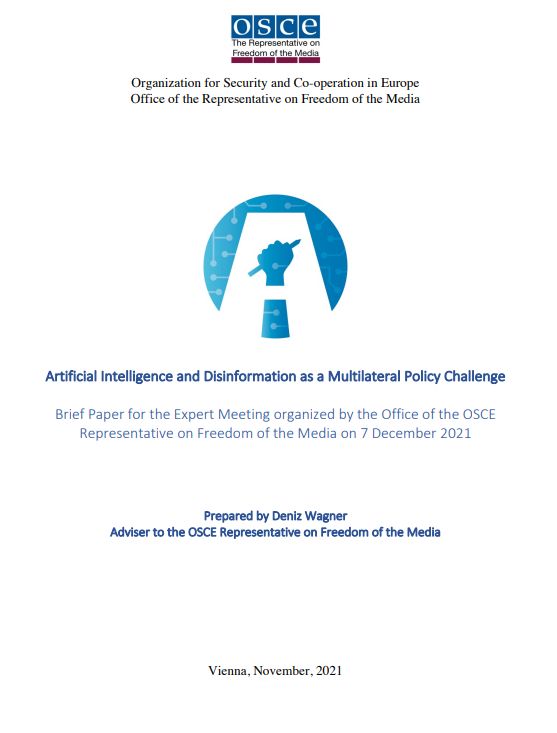
Artificial Intelligence and Disinformation as a Multilateral Policy Challenge
Office of the OSCE Representative on Freedom of the Media, November 2021
A paper discussing the century-old, international problem of how to counteract the dissemination of false reports and information. Prepared by Deniz Wagner, Adviser to the OSCE Representative on Freedom of the Media.
Go to resource
UNESCO Recommendation on the Ethics of Artificial Intelligence
UNESCO, November 2021
Adopted in 2021 by 193 UNESCO Member States, this is the first global framework on AI ethics. The UNESCO Recommendation aims at approaching AI ethics as a systematic normative reflection based on a holistic, comprehensive, multicultural and evolving framework of interdependent values, principles and actions that can guide societies in dealing responsibly with known and unknown impacts of AI technologies on human beings, societies and the environment.
Go to resource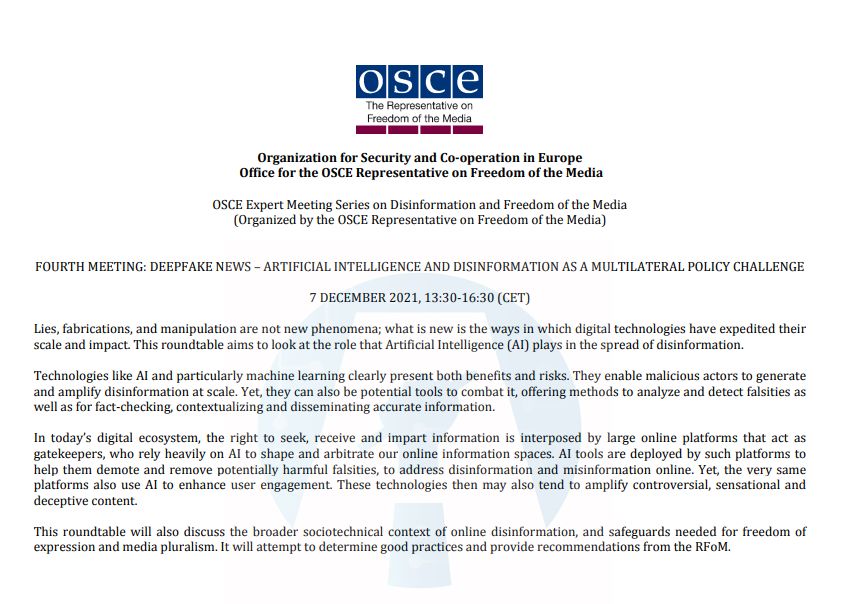
Fourth expert meeting: Deepfake news – Artificial intelligence and disinformation as a multilateral policy challenge
Office of the OSCE Representative on Freedom of the Media, December 2021
An expert roundtable exploring the role that AI can play in both enabling and combating the spread of disinformation. Experts also discuss the broader socio-technical context of online disinformation, and what safeguards are needed to protect freedom of expression and media pluralism.
Go to resource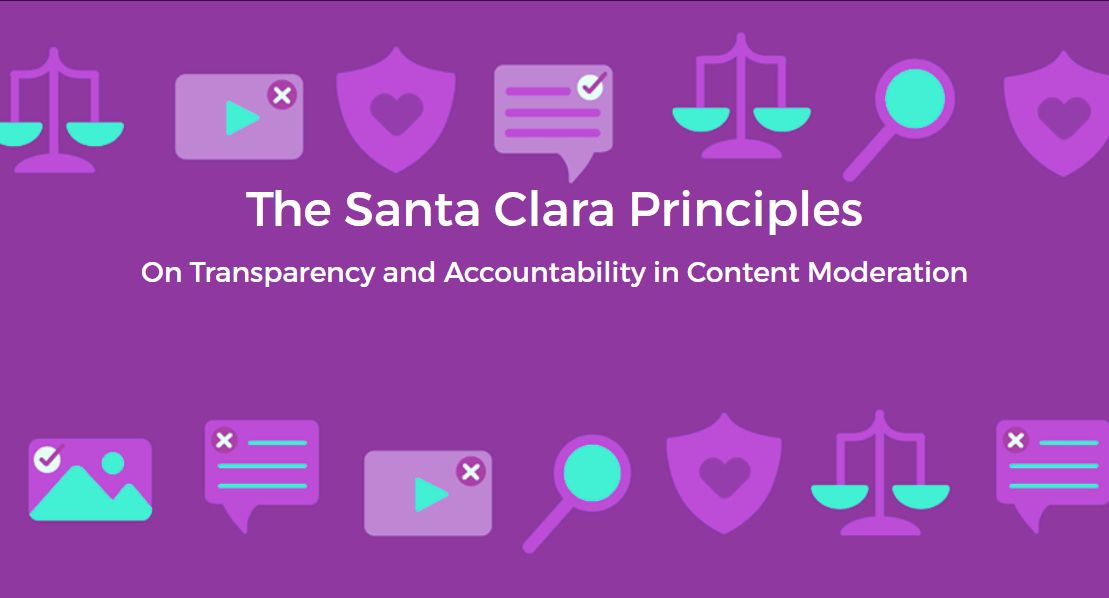
The Santa Clara Principles 2.9
December 2021
A set of minimum transparency and accountability standards for the moderation of online content, developed in 2018 and updated in 2021 by a consortium of civil society organizations and academics.
Go to resource
Social media, mind control and the right to freedom of thought
Better Human podcast. Episode 9. January 6, 2020
Are algorithms controlling our thoughts? Is Facebook like a totalitarian state? How can we stop political parties using our innermost thoughts to influence our decision-making? International human rights barrister Susie Alegre and Adam Wagner discuss how the human right to freedom of thought might be the most useful prism through which to answer these questions.
Go to resource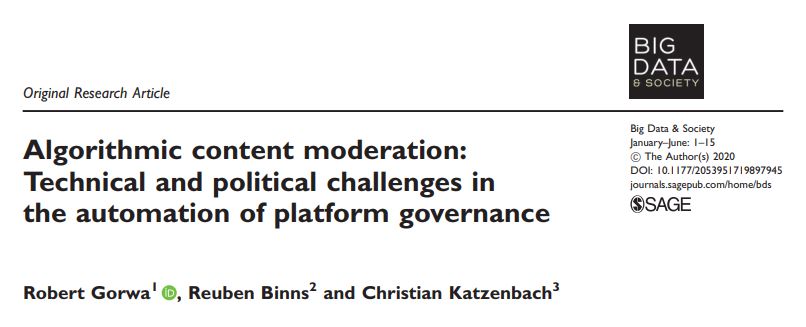
Algorithmic content moderation: Technical and political challenges in the automation of platform governance
Robert Gorwa, Reuben Binns, and Christian Katzenbach, Big Data & Society, February 2020
A technical primer of how algorithmic moderation works. This report examines some of the existing automated tools used by major platforms to handle copyright infringement, terrorist content, and toxic speech, and identifies key issues and challenges of these applications, particularly as reliance on them grows.
Go to resource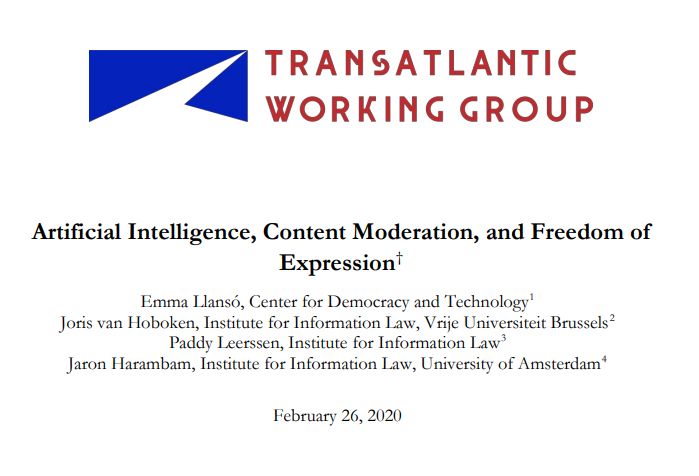
Artificial Intelligence, Content Moderation, and Freedom of Expression
Emma Llansó, Joris van Hoboken, Paddy Leerssen, and Jaron Harambam Working paper of the Transatlantic Working Group on Content Moderation Online and Freedom of Expression, February 2020
A working paper on the use of AI and automation to moderation and curate online content and the challenges this raises for the rights to freedom of expression and access to information. Part I focuses on content moderation and the use of automated systems for detecting and evaluating content at scale. Part II focuses on content curation and questions about the role of recommendation algorithms in amplifying hate speech, violent extremism, and disinformation.
Go to resource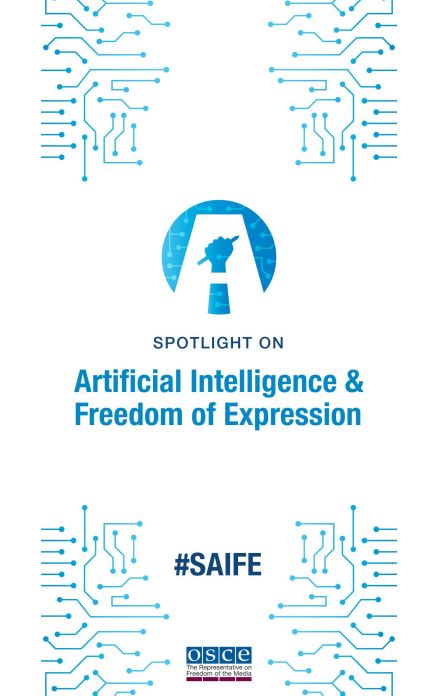
Non-paper on the impact of artificial intelligence on freedom of expression
Office of the OSCE Representative on Freedom of the Media, March 2020
This paper reviews the impact of AI and algorithms on human rights, focusing on how these technologies can be deployed in ways that censor the news and other information and stifle media freedom.
Go to resource
It's Not Just the Content, It's the Business Model: Democracy’s Online Speech Challenge
Nathalie Maréchal and Ellery Roberts Biddle, Ranking Digital Rights, March 2020
A report articulating the connection between surveillance-based business models and the health of U.S. democracy. Drawing from Ranking Digital Rights’ extensive research on corporate policies and digital rights, the report examines how content curation and content moderation algorithms are used to propagate and prohibit different forms of online speech, and how this can cause or catalyze social harm, particularly in the context of the 2020 U.S. election.
Go to resource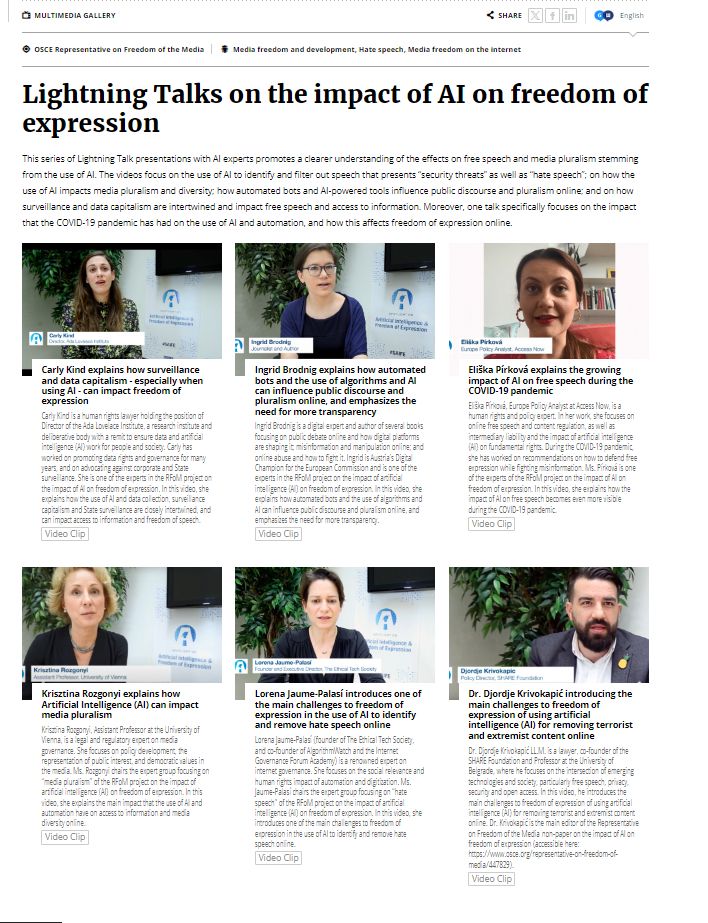
Lightning Talks on the impact of AI on freedom of expression
Office of the OSCE Representative on Freedom of the Media, April to June 2020
A series of “Lightning Talk” presentations with AI experts to promote a clearer understanding of the effects on free speech and media pluralism stemming from the use of AI.
Go to resource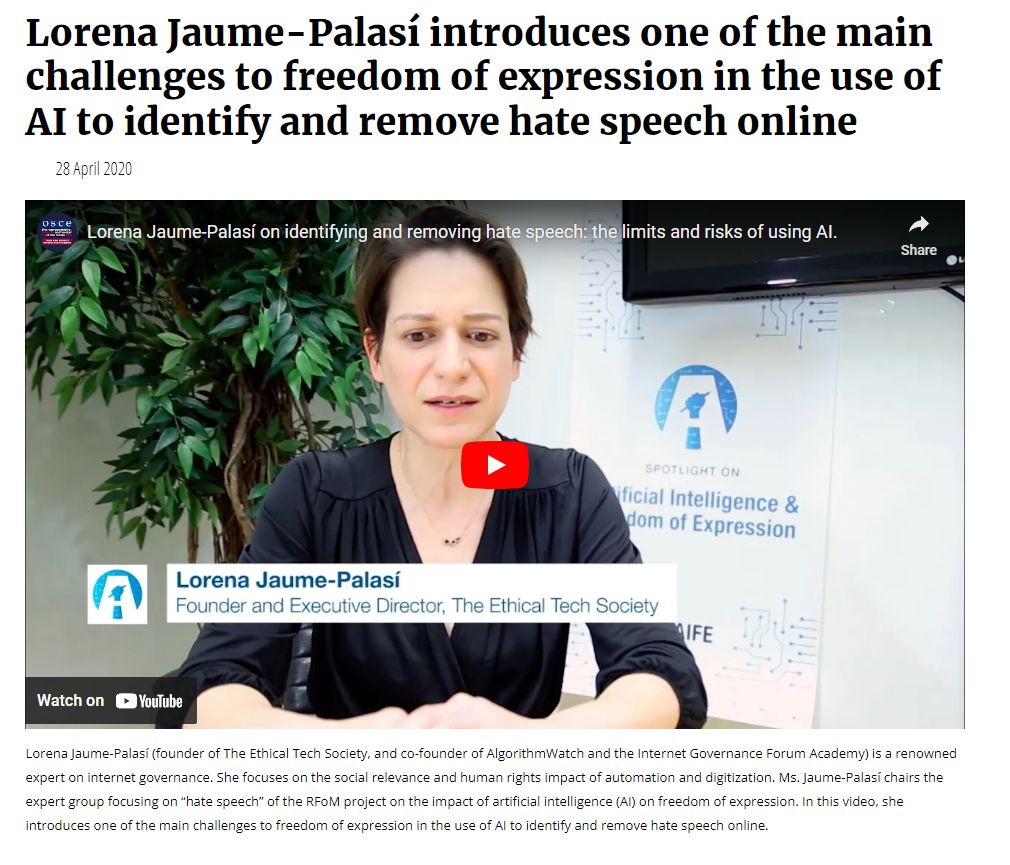
Lighting Talk on the impact of AI on freedom of expression: Challenges to freedom of expression in the use of AI to identify and remove hate speech online
Office of the OSCE Representative on Freedom of the Media, April 2020
Lorena Jaume-Palasí, founder of The Ethical Tech Society, and co-founder of AlgorithmWatch and the Internet Governance Forum Academy, introduces a major challenge to freedom of expression in the use of AI to identify and remove hate speech online.
Go to resource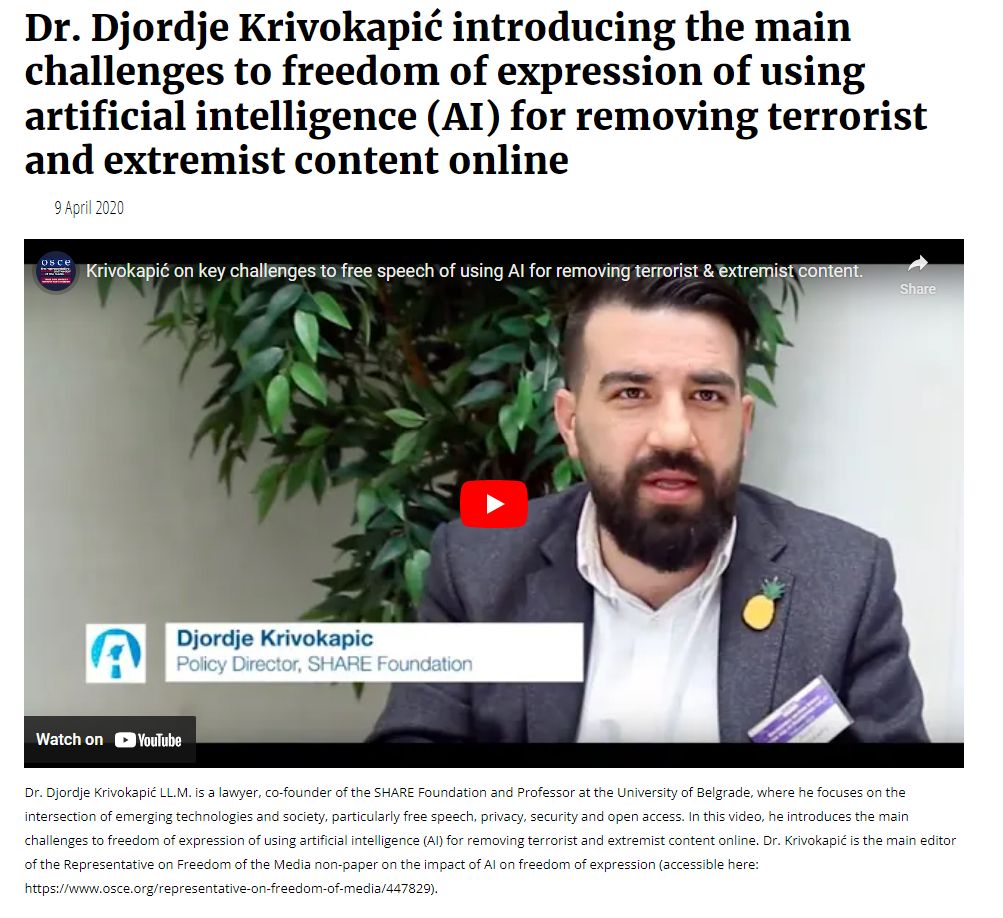
uat
Office of the OSCE Representative on Freedom of the Media, April 2020
Djordje Krivokapić, lawyer, co-founder of the SHARE Foundation and Professor at the University of Belgrade, introduces the main challenges to freedom of expression when using artificial intelligence (AI) for removing terrorist and extremist content online.
Go to resource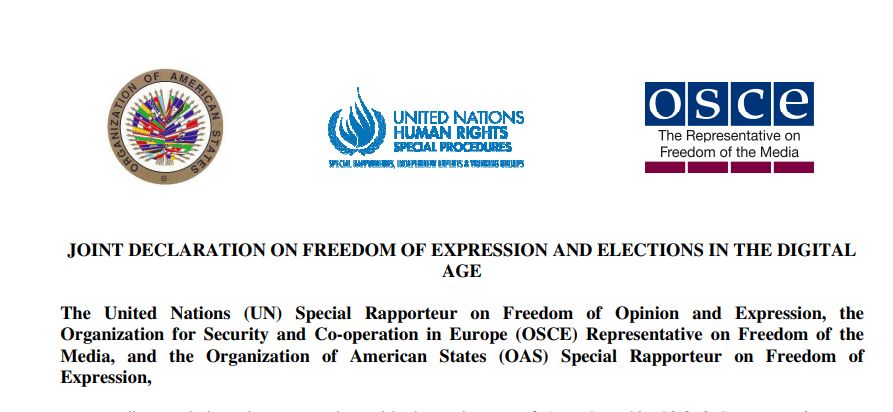
Joint Declaration on Freedom of Expression and Elections in the Digital Age
April 2020
Joint Declaration affirming commitments to freedom of expression during times of elections in the digital age by the UN Special Rapporteur on Freedom of Opinion and Expression, the OSCE Representative on Freedom of the Media, and the OAS Special Rapporteur on Freedom of Expression.
Go to resource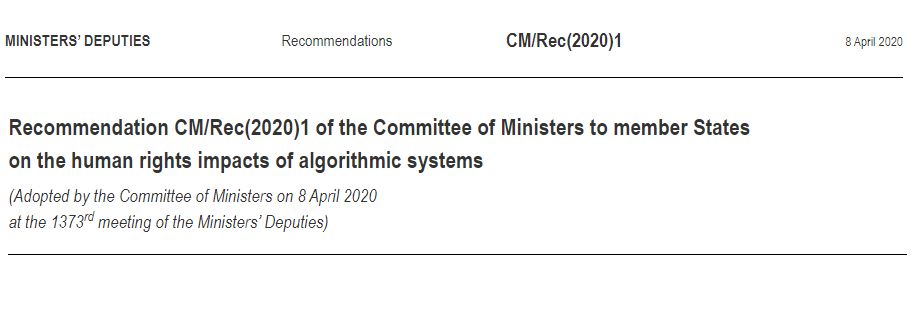
Recommendation CM/Rec(2020)1 of the Committee of Ministers to member States on the human rights impacts of algorithmic systems
Council of Europe, April 2020
The Committee of Ministers of the Council of Europe’s recommendations for the public and private sector for safeguarding human rights in their design, development, and deployment of algorithmic systems.
Go to resource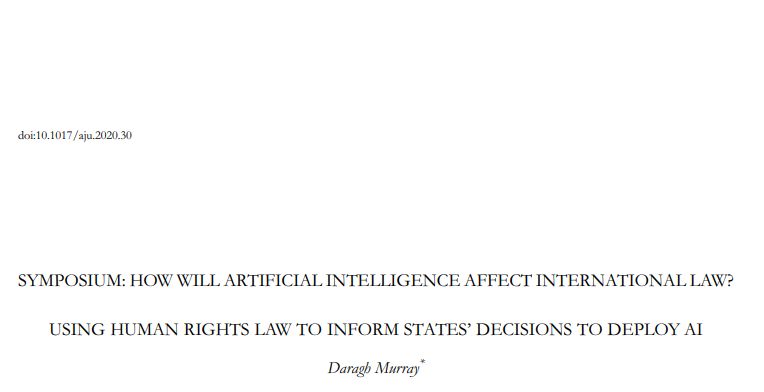
How will artificial intelligence affect international law? Using Human Rights Law to Inform States' Decisions to Deploy AI
Darragh Murray, AJIL Unbound 158, April 2020
Both the public and private sectors are investing heavily in the development of new AI tools and technologies. This paper underlines that these technologies are being deployed without a full understanding of their impact on individuals or society, and in the absence of effective domestic or international regulatory frameworks.
Go to resource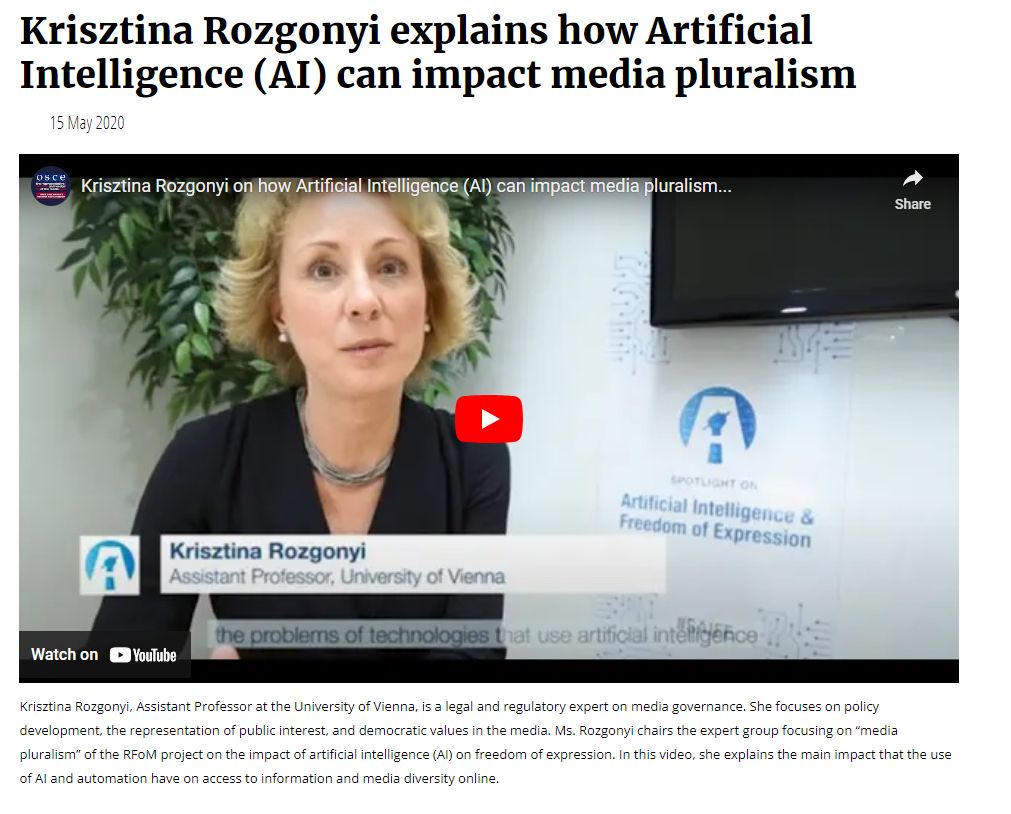
Lightning Talk on the impact of AI on freedom of expression: How Artificial Intelligence (AI) can impact media pluralism
Office of the OSCE Representative on Freedom of the Media, May 2020
Krisztina Rozgonyi, assistant professor at the University of Vienna and legal and regulatory expert on media governance, explains the main impact that the use of AI and automation have on access to information and media diversity online.
Go to resource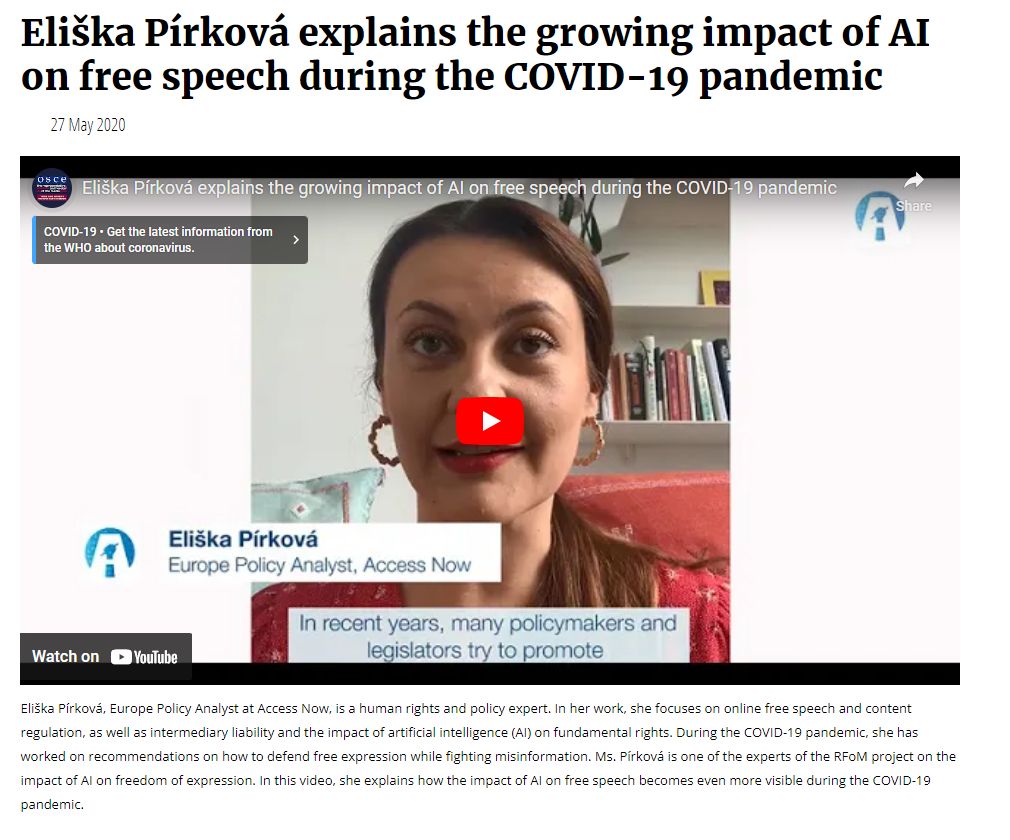
Lighting Talk on the impact of AI on freedom of expression: The growing impact of AI on free speech during the COVID-19 pandemic
Office of the OSCE Representative on Freedom of the Media, May 2020
Eliška Pírková, Europe Policy Analyst at Access Now explains how the impact of AI on free speech became even more visible during the COVID-19 pandemic.
Go to resource
Getting to the Source of Infodemics: It’s the Business Model
Nathalie Maréchal, Rebecca MacKinnon, and Jessica Dheere, Ranking Digital Rights, May 2020
A report addressing the root cause of the proliferation of harmful content online: the surveillance-based business model. Authors make the case for policy solutions that address the systemic causes of today’s “infodemic”—with measures that include corporate governance reform and strong data protection rules—rather than solutions that require intermediaries to police and remove harmful materials, which can result in undue restrictions to online speech and access to information online.
Go to resource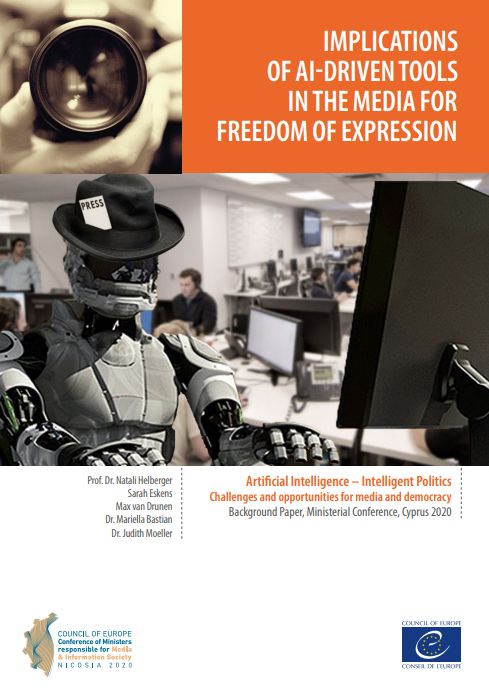
Implications of AI-driven tools in the media for freedom of expression
Council of Europe Background Paper, Ministerial Conference, Cyprus, 28-29, May 2020
An expert paper exploring the implications of AI-driven tools on the media and freedom of expression. Authors evaluate how AI systems can limit or narrow the availability of news content and information, which have detrimental effects on the public sphere and on the diversity of media markets.
Go to resource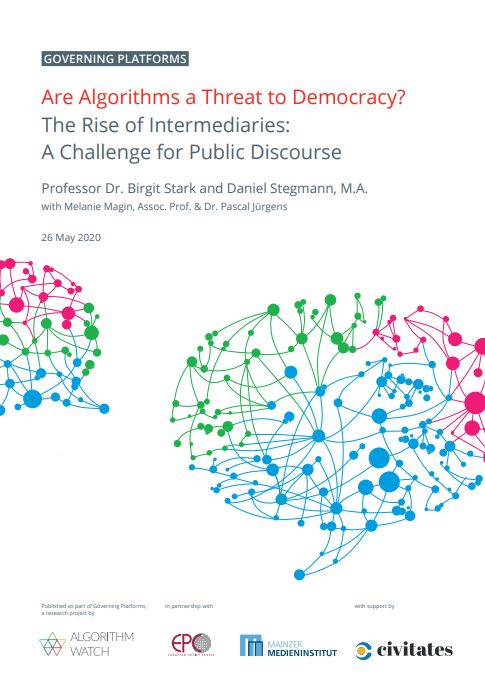
Are Algorithms a Threat to Democracy? The Rise of Intermediaries: A Challenge for Public Discourse
Birgit Stark, Daniel Stegmann, Melanie Magin, and Pascal Jürgens, Algorithm Watch, May 2020
Researchers at the Berlin-based NGO Algorithm Watch explore how algorithms threaten public discourse and democracy. This report explores key research on how algorithmic news curation can drive the development of so-called “echo chambers,” and finds that while the effects of such filter bubbles can be overstated the risk of societal fragmentation and polarization remains.
Go to resource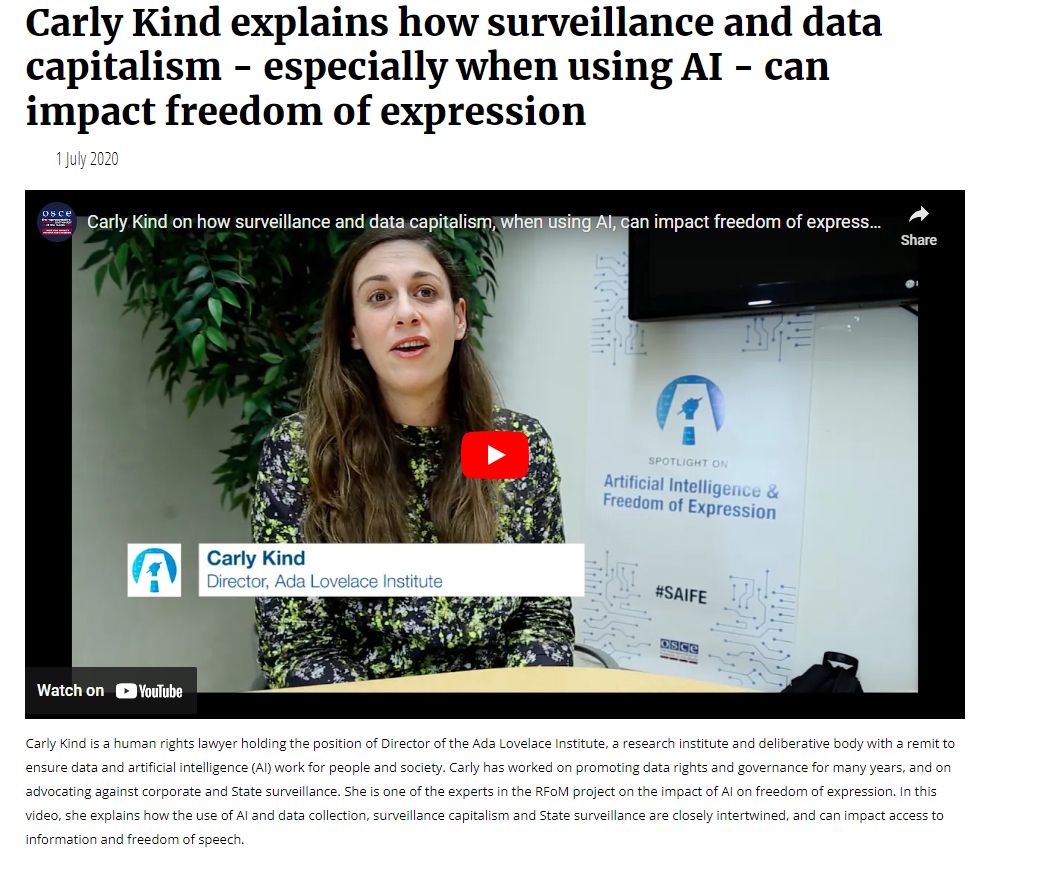
Lighting Talk on the impact of AI on freedom of expression: How surveillance and data capitalism - especially when using AI - can impact freedom of expression
Office of the OSCE Representative on Freedom of the Media, June 2020
Human rights lawyer Carly Kind, director of the Ada Lovelace Institute, explains how the use of AI and data collection, surveillance capitalism and state surveillance are closely intertwined, and how it can impact access to information and freedom of speech.
Go to resource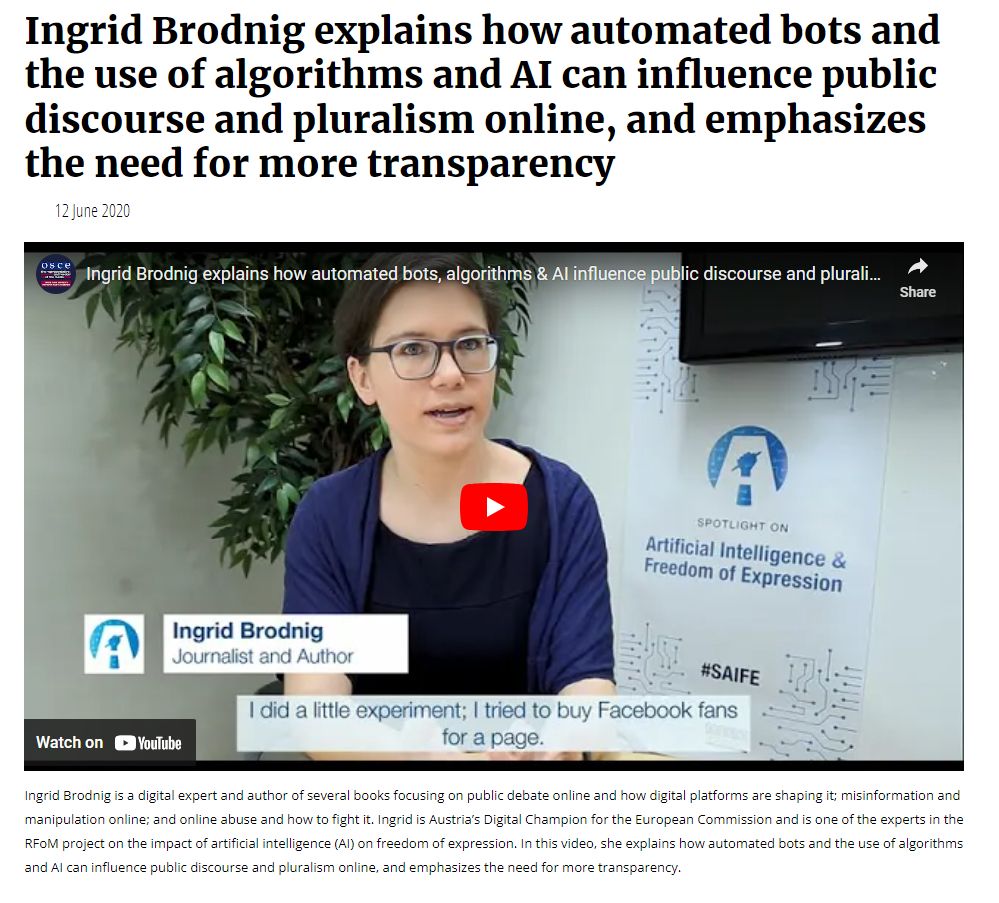
Lighting Talk on the impact of AI on freedom of expression: How automated bots and the use of algorithms and AI can influence public discourse and pluralism online
Office of the OSCE Representative on Freedom of the Media, June 2020
Ingrid Brodnig, digital expert and scholar, explains how automated bots and the use of algorithms and AI can influence public discourse and pluralism online, while she emphasizes the need for more transparency.
Go to resource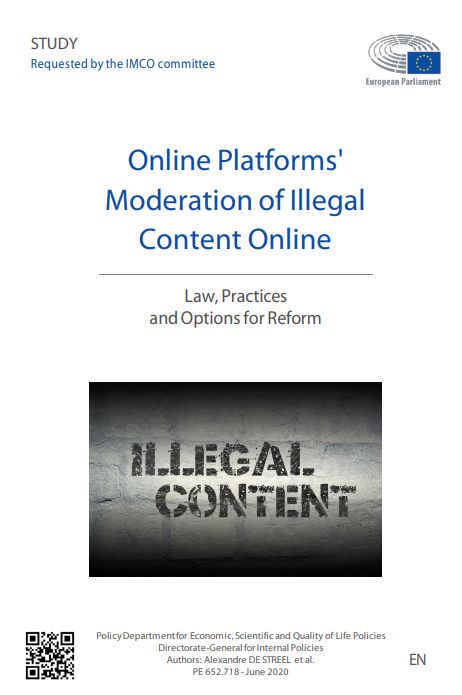
Online Platforms' Moderation of Illegal Content Online Law, Practices and Options for Reform
Policy Department for Economic, Scientific and Quality of Life Policies at the request of the committee on Internal Market and Consumer Protection (IMCO), European Parliament, June 2020
A report evaluating how automated content-filtering technologies can restrict the display of unlawful or otherwise problematic content but can also lead to over censorship of online speech, particularly discussions of gender equality and hate speech.
Go to resource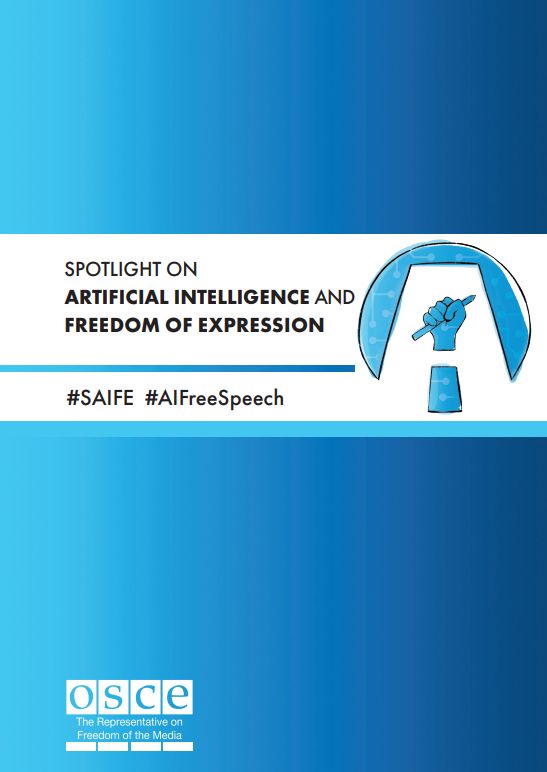
Strategy paper to Put a Spotlight on Artificial Intelligence and Freedom of Expression
Office of the OSCE Representative on Freedom of the Media, July 2020
This paper addresses the impact of artificial intelligence on freedom of expression, focusing on key challenges of deploying AI to curate and moderate online content, particularly for content related to national security and hate speech. It identifies a number of overarching problems that AI poses to freedom of expression and to human rights more broadly, which stem from a lack of transparency in the design and deployment of AI, a lack of accountability and independent oversight over these AI systems, and a lack of effective remedies for freedom of expression violations linked to or caused by AI.
Go to resource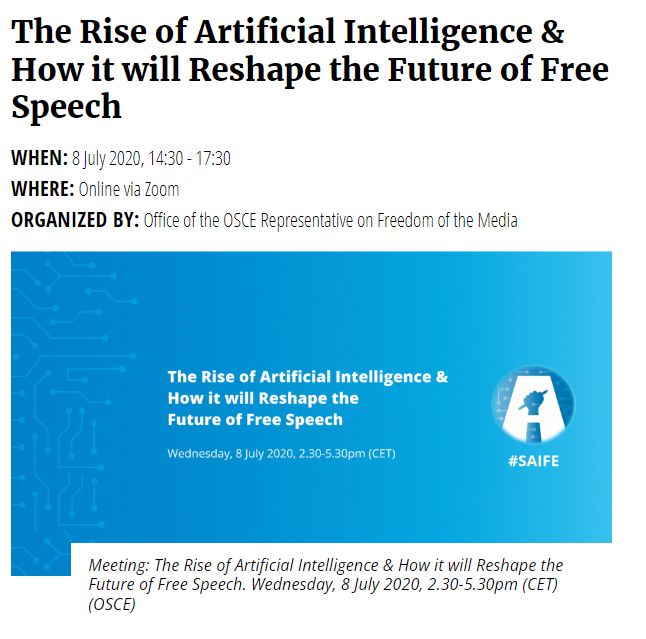
The Rise of Artificial Intelligence & How it will Reshape the Future of Free Speech
Office of the OSCE Representative on Freedom of the Media, July 2020
Experts from civil society, academia, and the tech industry discuss the impact of artificial intelligence, algorithmic systems, and machine-learning technologies in shaping and arbitrating online information, the potential risks this poses to freedom of expression, and ways to safeguard free speech when deploying automation and AI.
Go to resource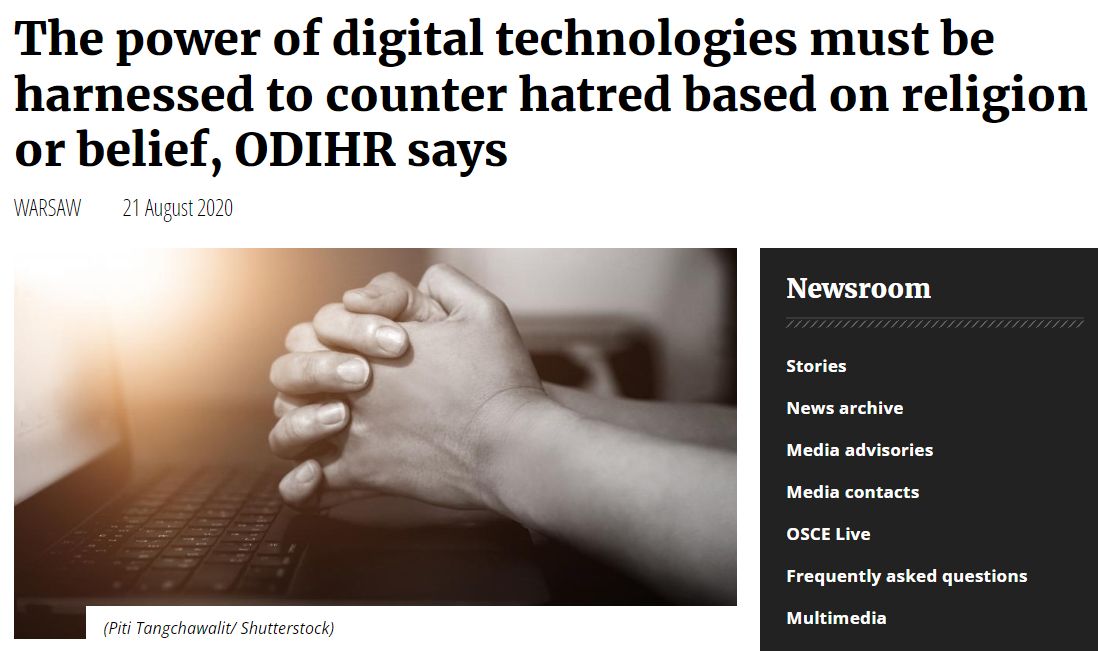
Press release: The power of digital technologies must be harnessed to counter hatred based on religion or belief, ODIHR says
OSCE Office for Democratic Institutions and Human Rights, August 2020
On the eve of the International Day Commemorating the Victims of Acts of Violence Based on Religion or Belief, the OSCE Office for Democratic Institutions and Human Rights (ODIHR) calls for better use to be made of the advantages that digital technologies can offer, as well as a greater emphasis on countering hatred online
Go to resource
How online misinformation murdered the truth
MIT Tech Review’s DeepTech podcast. October 20, 2020
MIT Tech Review reporters Abby Ohlheiser and Patrick Howell O’Neill discuss how internet platforms failed to control the flood of misinformation ahead of the 2020 U.S. presidential election. “[It’s] as if the platforms were trying to stop a river from flooding by tossing out water in buckets,” according to Ohlheiser.
Go to resource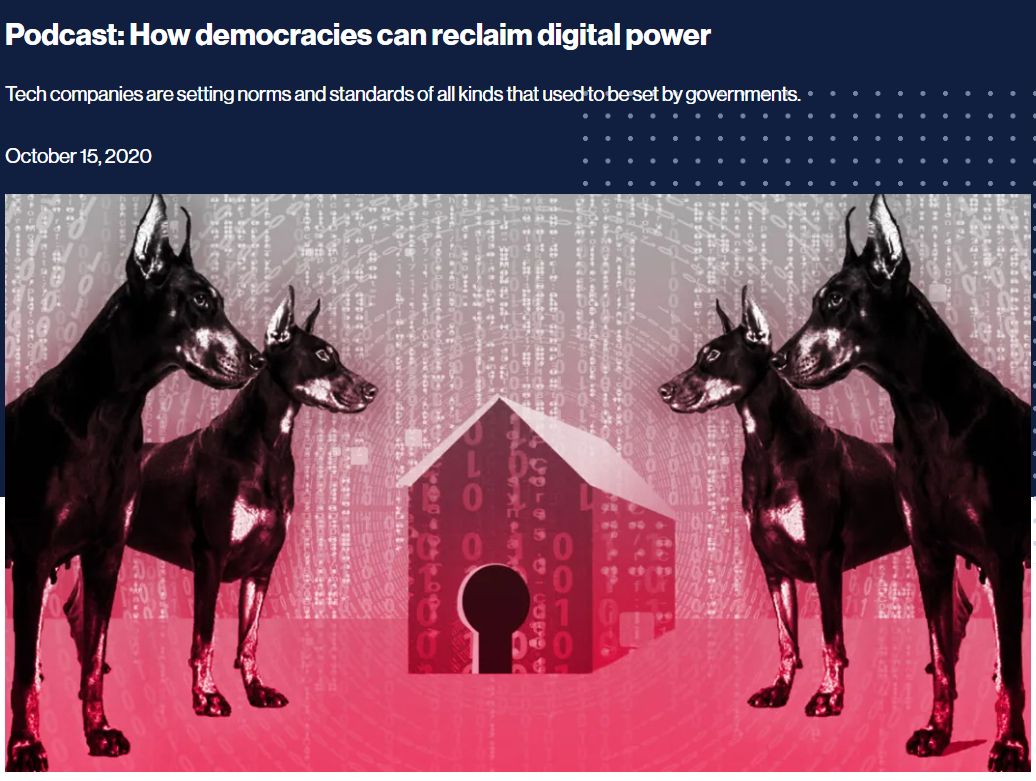
How democracies can reclaim digital power
MIT Tech Review’s DeepTech podcast. October 15, 2020
In this episode of MIT Tech Review’s Deep Tech podcast, Dutch former MEP Marietje Schaake discusses how national regulators are not doing enough to enforce democratic values in technology. She joins MIT Tech ReviewEditor-in-Chief Gideon Lichfield to discuss how decisions made in the interests of business are dictating the lives of billions of people.
Go to resource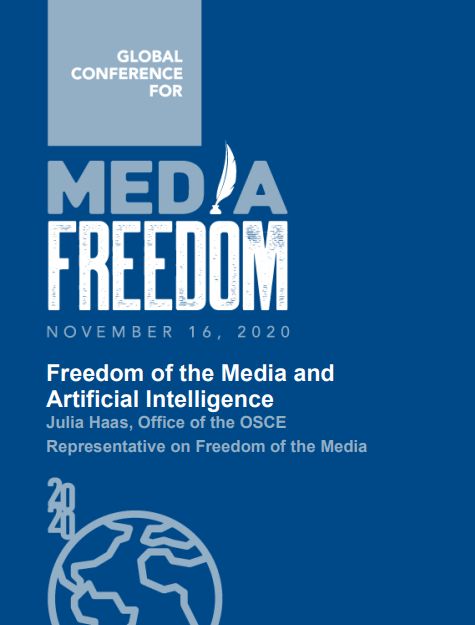
Policy paper on freedom of the media and artificial intelligence
Office of the OSCE Representative on Freedom of the Media, November 2020
While AI can improve communications, it can also be deployed in ways that can threaten human rights. In this paper, Julia Haas of the Office of the OSCE Representative on Freedom of the Media presents a summary of how AI can negatively impact freedom of expression and media freedom.
Go to resourcePractical guidance for businesses, and other actors in the digital ecosystem, on how to conduct human rights impact assessment of digital activities
Danish Institute for Human Rights, November 2020
The Danish Institute for Human Rights’ guidance for conducting human rights impact assessments for private and public sector entities that design, develop, sell, procure, deploy, apply or otherwise use digital projects, products and services.
Go to resource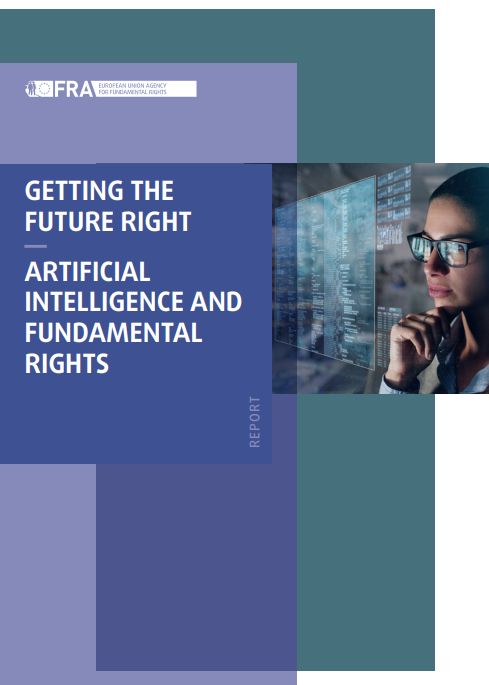
Getting the Future Right – Artificial Intelligence and Fundamental Rights in the EU
EU Agency for Fundamental Rights, December 2020
A report by the EU Agency for Fundamental Rights (FRA) highlighting the urgent need to imbed human rights safeguards into how artificial intelligence is developed and deployed. Findings based on 91 interviews with public administration officials and staff members of private companies in select EU-member states. They were asked about their use of AI, their awareness of the fundamental rights issues involved, and best practices for assessing and mitigating risks linked to the use of AI.
Go to resource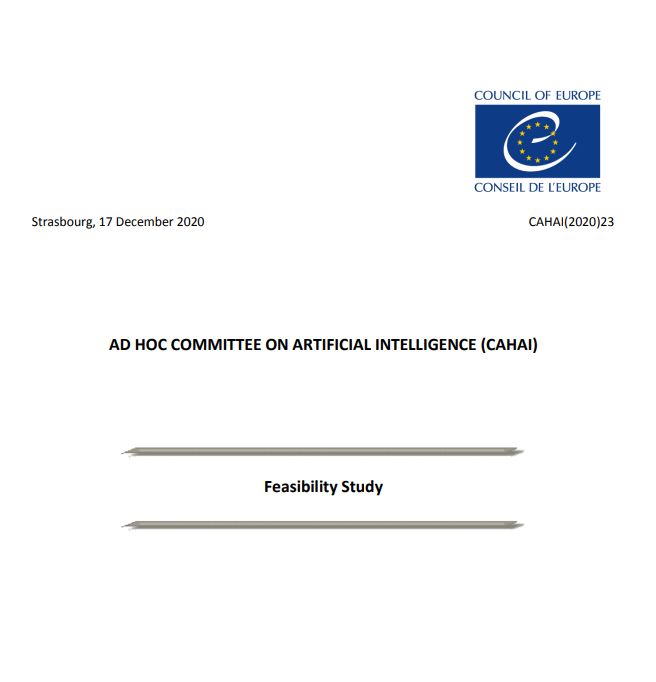
Ad Hoc Committee on Artificial Intelligence (CAHAI)’s Feasibility Study
Council of Europe, December 2020
A report exploring the impact of artificial intelligence on human rights and democracy, and providing options for an international legal response that fills existing legislative gaps, and that tailors binding and non-binding legal instruments to the specific risks and opportunities presented by AI systems.
Go to resource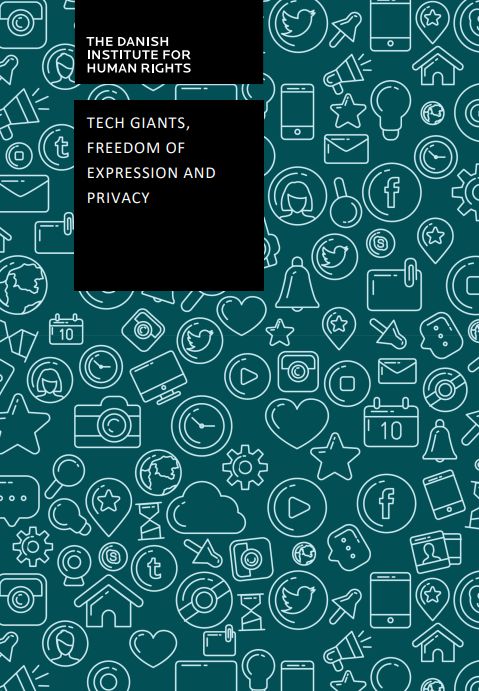
Tech-Giants, Freedom of Expression and the Right to Privacy
Rikke Frank Jørgensen and Marya Akhtar, The Danish Institute for Human Rights, December 2020
A report by researchers at the Danish Institute for Human Rights addressing how content moderation and curation by digital platforms can affect freedom of expression and the right to privacy and protection of personal data.
Go to resource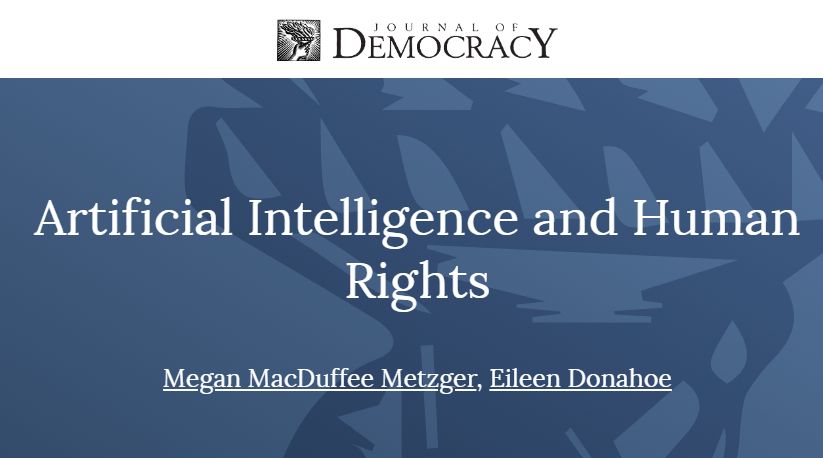
Artificial Intelligence and Human Rights
Eileen Donahoe and Megan MacDuffee Metzger. Journal of Democracy, vol. 30 no. 2, 2019, p. 115-126
The rapid adoption of AI systems by both governments and the private sector have sparked concerns about potential negative implications for human dignity, democratic accountability, and the bedrock principles of free societies. Authors advocate for a global AI governance framework grounded in international human rights.
Go to resource
How Recommendation Algorithms Run the World
Zeynep Tufekci, Wired, April 2019
Sociologist Zeynep Tufekci explores how recommendation algorithms influence what people buy, read, and watch online, based on highly opaque digital profiles of users assembled by private platforms using troves of personal data.
Go to resource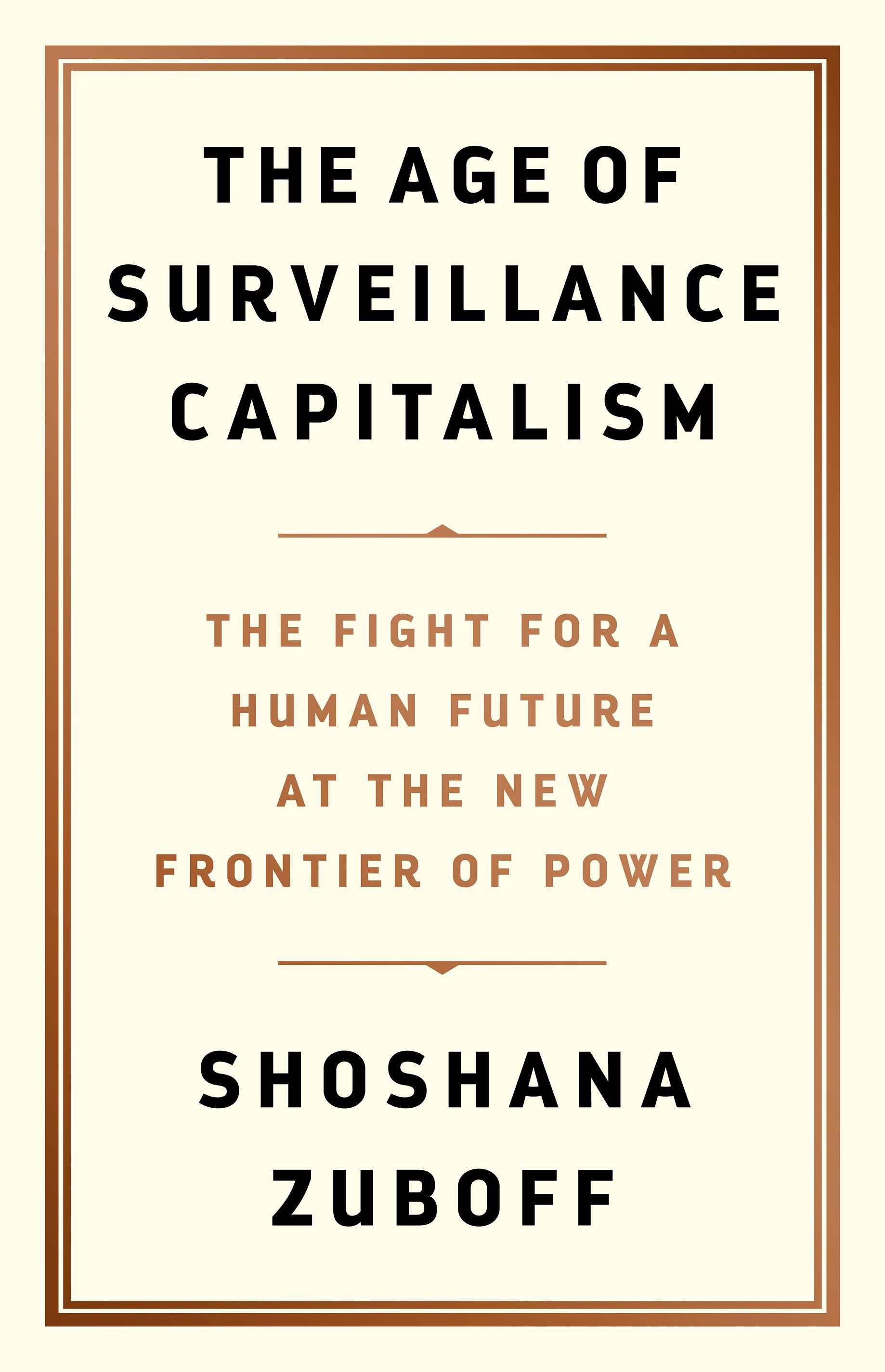
The Age of Surveillance Capitalism: The Fight for a Human Future at the New Frontier of Power
Shoshana Zuboff, New York: PublicAffairs, March 2019
Harvard professor Shoshana Zuboff examines the growing power of tech companies and suggests that their business models represent a new form of capitalist accumulation that she calls “surveillance capitalism”. This model represents an unprecedented form of corporate power that has flourished free from democratic oversight.
Go to resource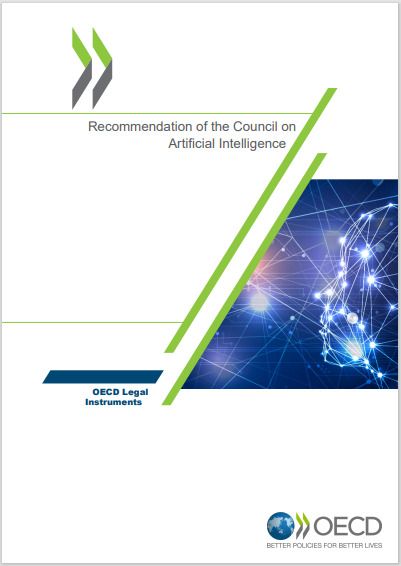
OECD Recommendation of the Council on Artificial Intelligence
OECD Legal Instruments, May 2019
The Recommendation on Artificial Intelligence is the first intergovernmental standard on AI, and was adopted by the OECD Council. Its aim is to foster innovation and trust in AI, while ensuring respect for human rights and democratic values. It was revised in 2023 and 2024 to reflect technological and policy developments, including with respect to generative AI, and to further facilitate the recommendations' implementation.
Go to resource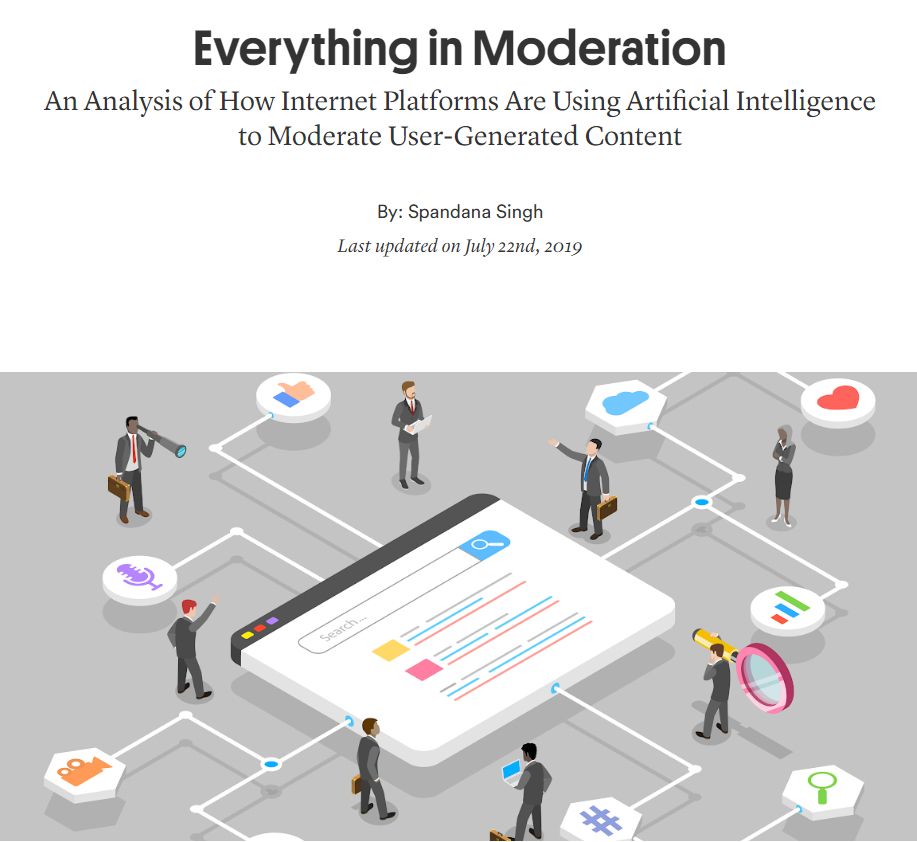
Everything in Moderation: An Analysis of How Internet Platforms Are Using Artificial Intelligence to Moderate User-Generated Content
Spandana Singh, Open Technology Institute, July 2019
A report focusing on the automated content moderation policies and practices of three platforms—Facebook, Reddit, and Tumblr—to highlight the different ways these tools are deployed to police content and the challenges associated with each of them.
Go to resource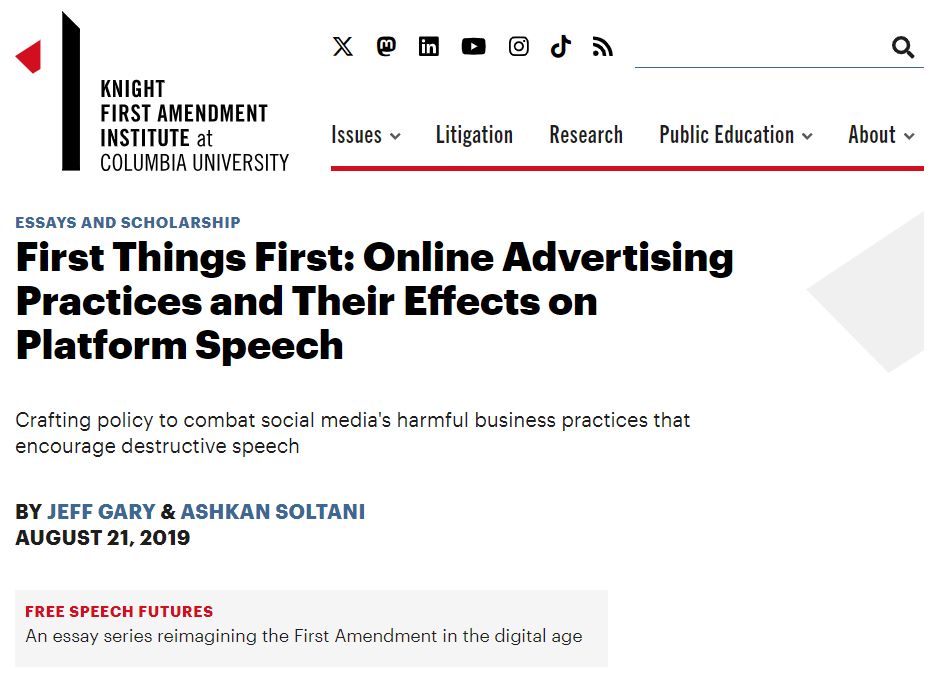
First Things First: Online Advertising Practices and Their Effects on Platform Speech
Jeff Gary and Ashkan Soltani, Knight First Amendment Institute, August 2019
Tech policy experts Jeff Gary and Ashkan Soltani discuss the freedom of expression challenges of content moderation. They argue that rather than requiring platforms to remove harmful content, policymakers should instead focus on targeted advertising and the underlying business model that incentivizes and amplifies the proliferation of much of the harmful speech online.
Go to resource
Rising Through the Ranks: How Algorithms Rank and Curate Content in Search Results and on News Feeds
Spandana Singh. New America’s Open Technology Institute, October 2019
A report exploring how internet platforms are using automated tools to shape the content we see and access, analyzing how ranking, prioritization, and recommendation systems work and deliver targeted content to users.
Go to resource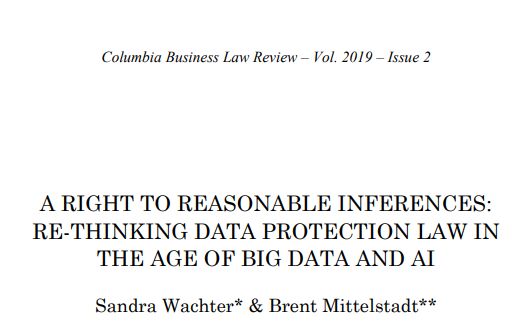
A Right to Reasonable Inferences: Re-Thinking Data Protection Law in the Age of Big Data and AI
Sandra Wachter and Brent Mittelstadt, Columbia Business Law Review, October 2019
A study of how big data analytics and artificial intelligence are used to draw often unverifiable inferences and predictions about the behaviors, preferences, and private lives of individuals. These inferences draw on deeply privacy-invasive datasets that can result discriminatory and biased algorithms.
Go to resource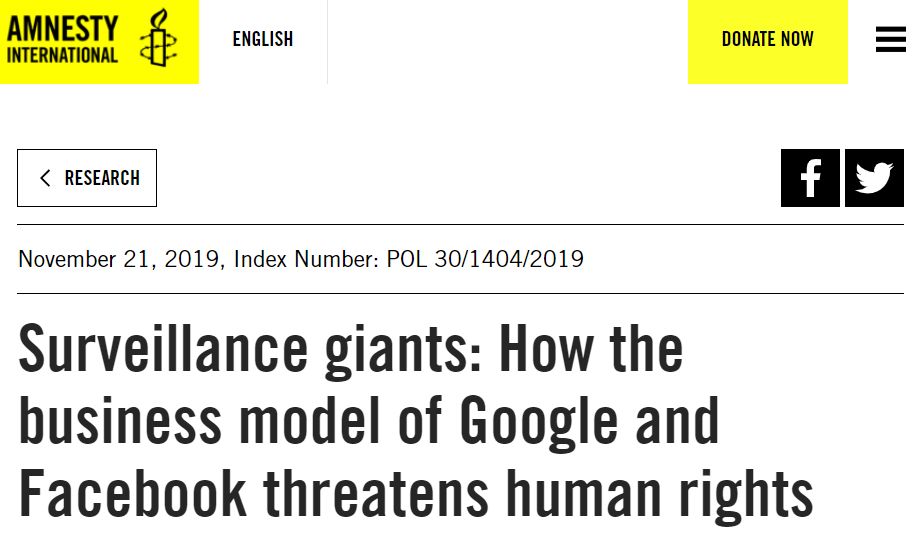
Surveillance Giants: How the Business Model of Google and Facebook Threatens Human Rights
Amnesty International, November 2019
A report illuminating how the surveillance-based business model of Facebook and Google is inherently incompatible with the right to privacy and poses a systemic threat to a range of other rights, including freedom of opinion and expression, freedom of thought, and the right to equality and non-discrimination.
Go to resource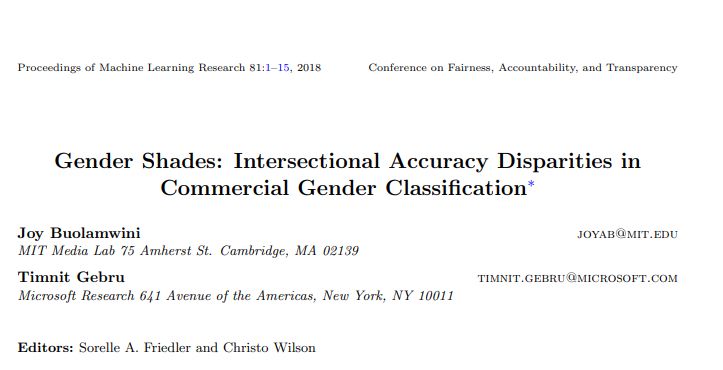
Gender Shades: Intersectional Accuracy Disparities in Commercial Gender Classification
Joy Buolamwini and Timnit Gebru, Proceedings of Machine Learning Research, Feburary 2018
Machine-learning algorithms can discriminate based on categories such as race and gender. Scholars Joy Buolamwini and Timnit Gebru offer an approach for evaluating bias in automated facial analysis algorithms and datasets.
Go to resource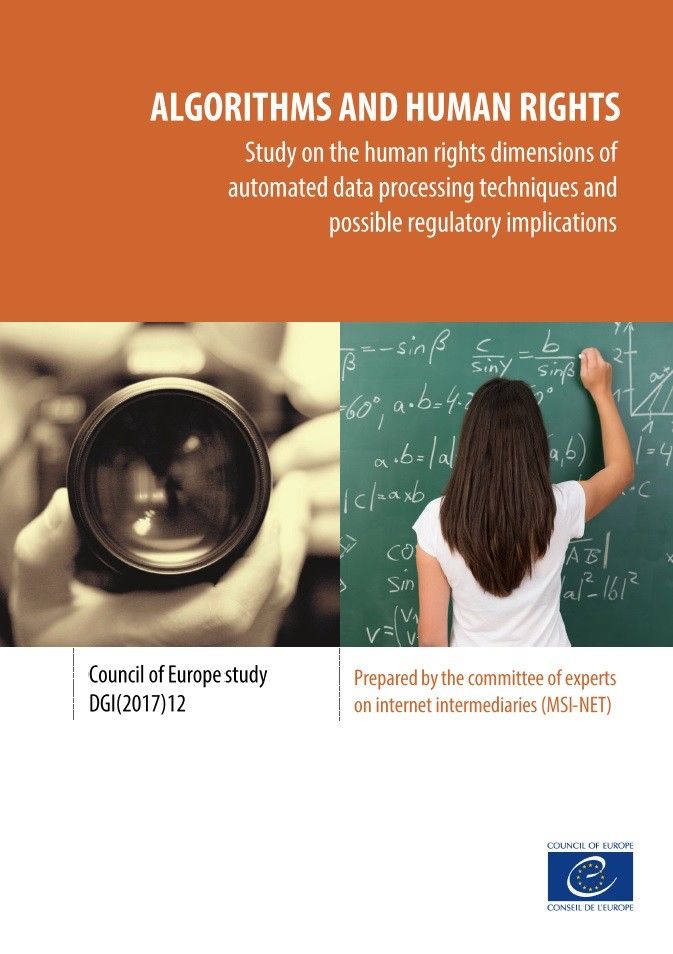
Algorithms and Human Rights: Study on the Human Rights Dimensions of Automated Data Processing Techniques and Possible Regulatory Implications
Council of Europe study, March 2018
An expert report evaluating the impact of algorithms and automated data processing techniques on human rights, including implications for rule of law principles and judiciary processes.
Go to resource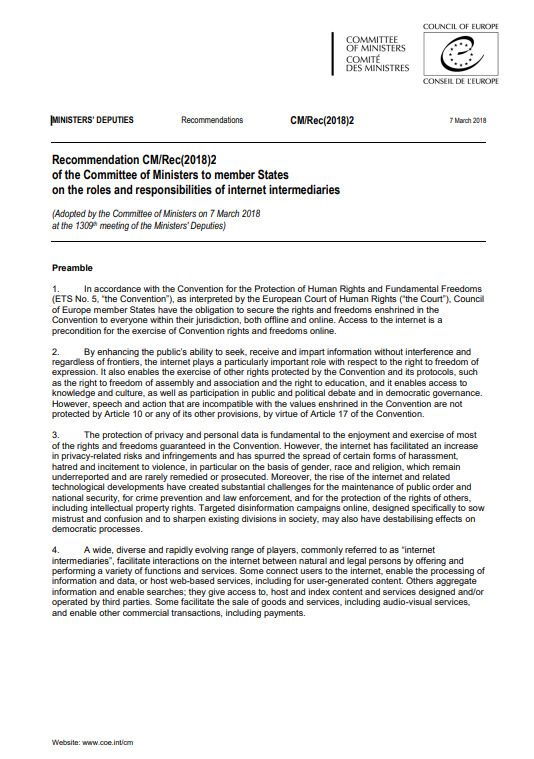
Recommendation CM/Rec (2018)2 of the Committee of Ministers to member States on the roles and responsibilities of internet intermediaries
Council of Europe, March 2018
In order to provide guidance to all relevant actors who are faced with the complex task of protecting and respecting human rights in the digital environment, this document establishes a list of recommendations to CoE member States, encouraging them to ensure that internet intermediaries fulfil their responsibilities to respect human rights in line with the recognized international standards.
Go to resource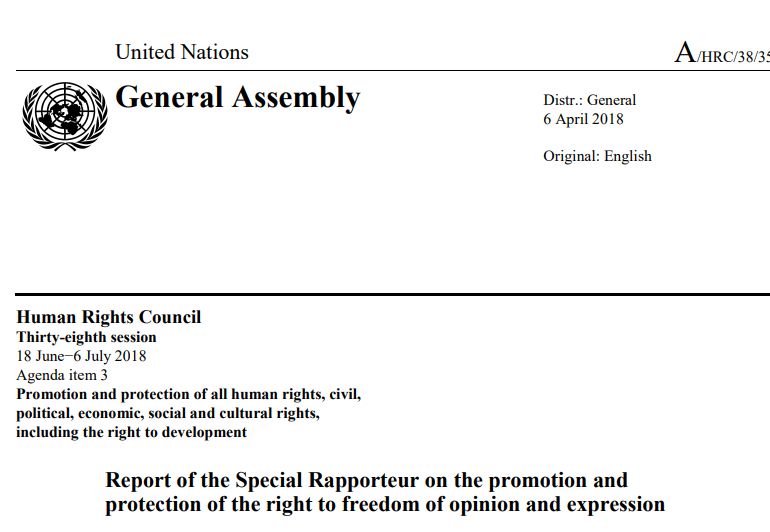
Report of the Special Rapporteur on the promotion and protection of the right to freedom of opinion and expression
submitted to the Human Rights Council (A/HRC/38/35), April 2018
A human rights-centered approach to online content moderation presented by then UN Special Rapporteur on the promotion and protection of the right to freedom of opinion and expression, David Kaye.
Go to resource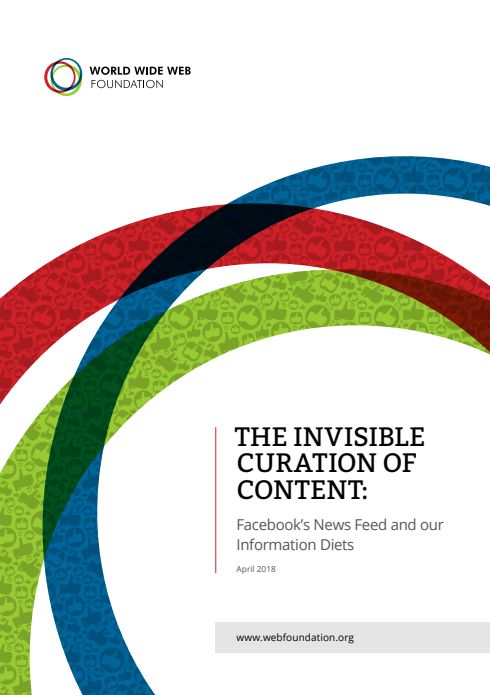
The invisible curation of content: Facebook’s News Feed and our information diets
World Wide Web Foundation, April 2018
The World Wide Web Foundation explores Facebook’s newsfeed algorithm to show that we have little comprehension of how these systems work, despite the power they have to shape our public discourse.
Go to resource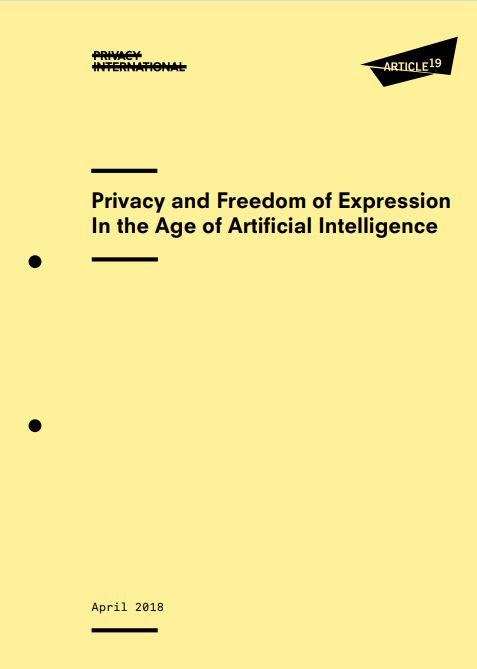
Privacy and Freedom of Expression in the Age of Artificial Intelligence
Privacy International and Article 19, April 2018
A joint paper by Privacy International and Article 19 addressing the privacy and freedom of expression risks of artificial intelligence and machine learning.
Go to resource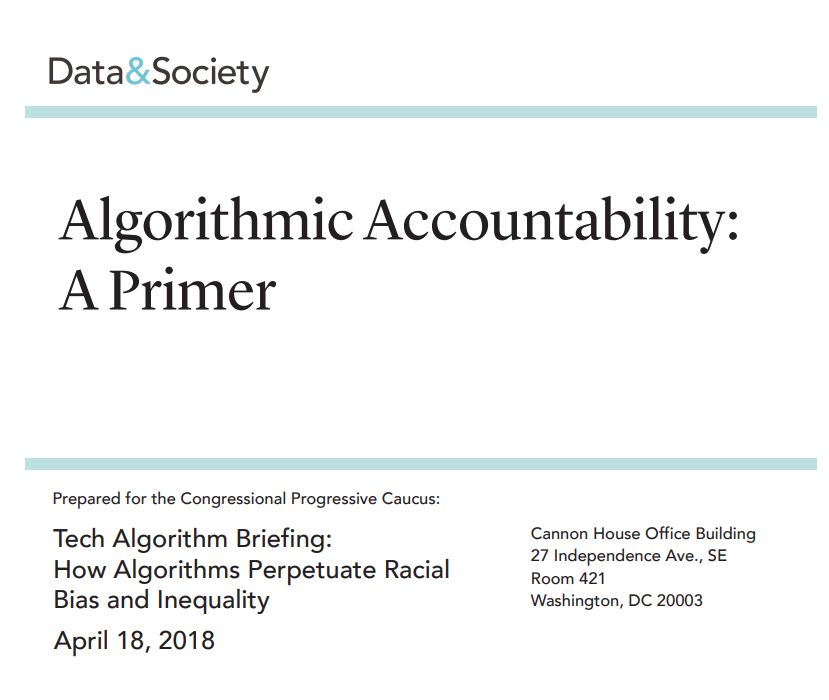
Algorithmic Accountability: A Primer
Data & Society, April 2018
A primer that unpacks key AI concepts and definitions, including how AI can reinforce bias and discrimination.
Go to resource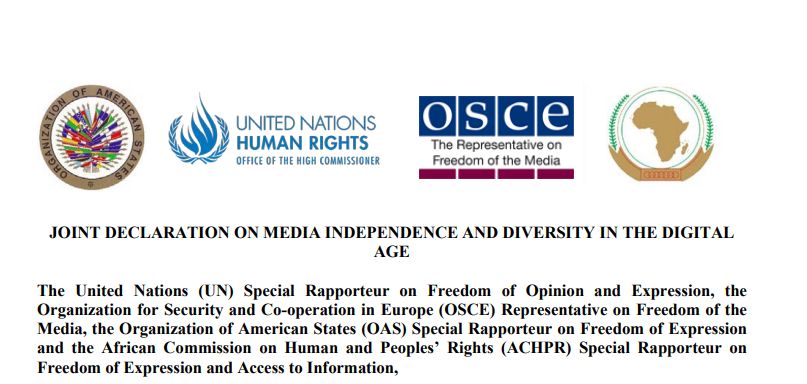
Joint Declaration on Media Independence and Diversity in the Digital Age
May 2018
Joint Declaration on the importance of an independent, pluralistic media in the digital age by the UN Special Rapporteur on Freedom of Opinion and Expression, the OSCE Representative on Freedom of the Media, the OAS Special Rapporteur on Freedom of Expression and the ACHPR Special Rapporteur on Freedom of Expression and Access to Information.
Go to resource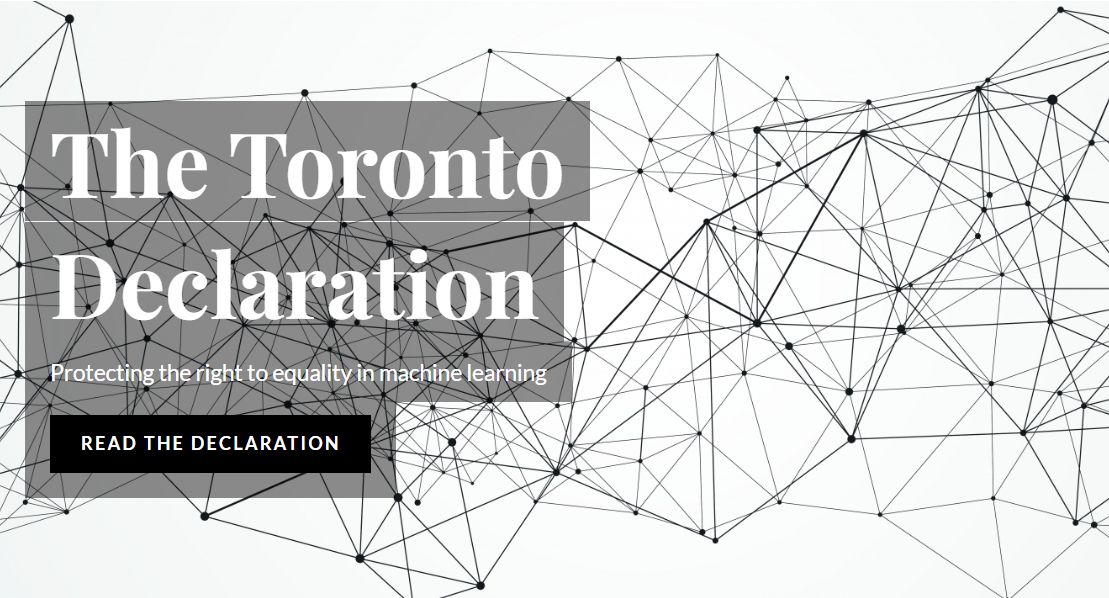
The Toronto Declaration
May 2018
Led by Amnesty International and Access Now, the Toronto Declaration calls on governments and companies to urgently protect human rights in the age of artificial intelligence, with a focus on the right to equality and non-discrimination.
Go to resource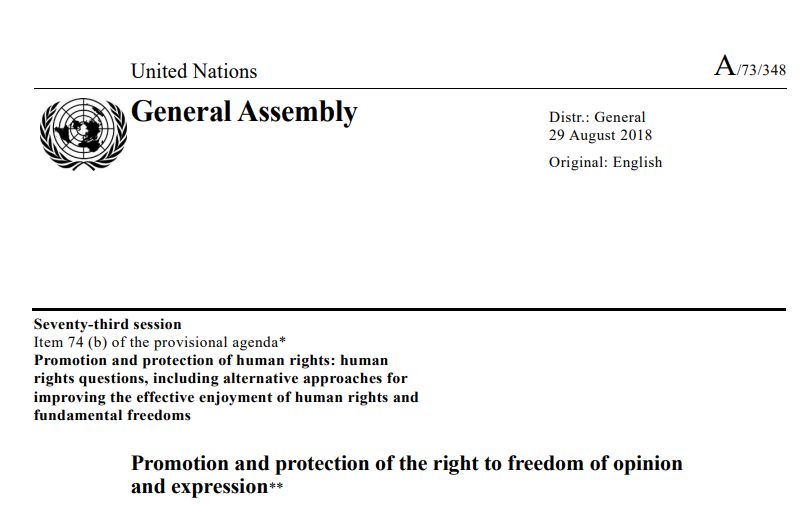
Report of the Special Rapporteur on the promotion and protection of the right to freedom of opinion and expression on artificial intelligence
submitted in accordance with Human Rights Council resolution 34/18, August 2018
A report by then UN Special Rapporteur on the promotion and protection of the right to freedom of opinion and expression, David Kaye that identifies the human rights legal framework relevant to artificial intelligence and presenting preliminary recommendations for ensuring human rights are built into the development and deployment of these technologies.
Go to resource
The Anatomy of an AI System
Vladan Joler and Kate Crawford, September 2018
An anatomical map and long-form essay of human labor, data, and planetary resources required to power Amazon Echo, created by scholars Vladan Joler, a professor at the Art Academy of the University of Novi Sad and co-founder of the SHARE Foundation, and Kate Crawford, a professor at New York University and co-founder and co-director of the AI Now Institute.
Go to resource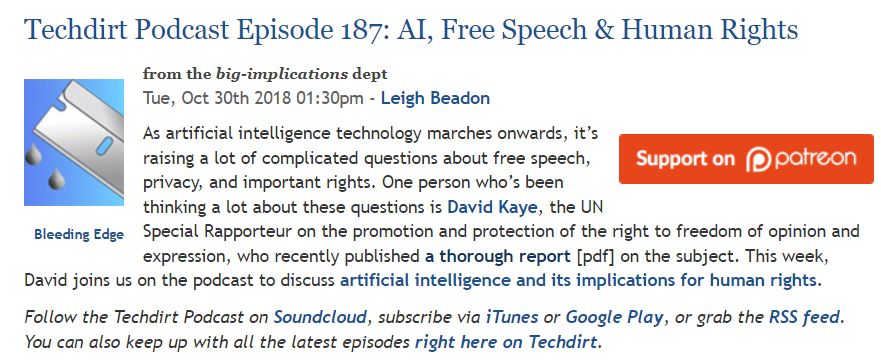
AI, Free Speech & Human Rights
Techdirt Podcast Episode 187. October 30, 2018
Artificial intelligence is raising complex questions about free speech, privacy, and other important rights. An in-depth discussion on artificial intelligence and its implications on human rights with David Kaye, former UN Special Rapporteur on the promotion and protection of the right to freedom of opinion and expression.
Go to resource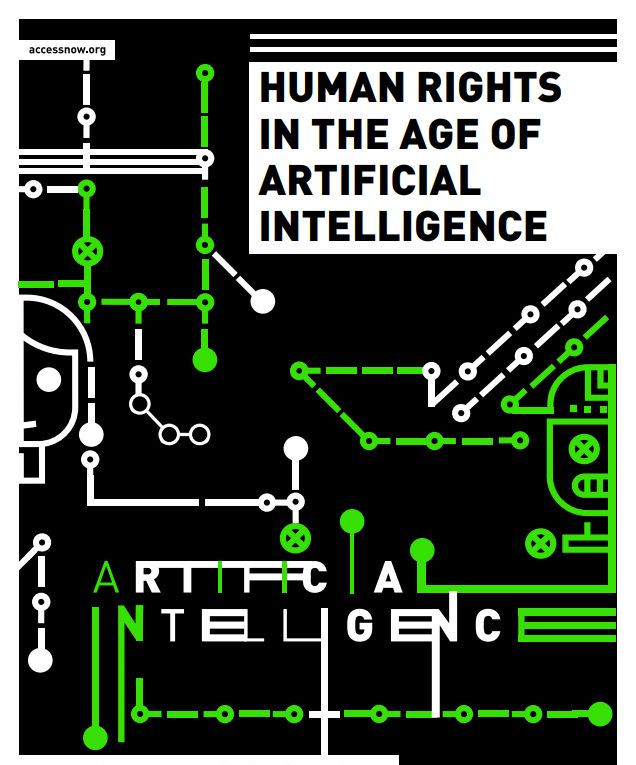
Human Rights in the Age of Artificial Intelligence
Access Now, November 2018
A report advocating for the application of international human rights law as the framework for developing global AI policy. It includes policy recommendations that push for strong data protection rules to protect privacy rights in the data sets used to develop and feed artificial intelligence systems; special safeguards for government uses of artificial intelligence; safeguards for private sector uses of artificial intelligence systems; and investment in more research to continue to examine the future of artificial intelligence and its potential interferences with human rights.
Go to resource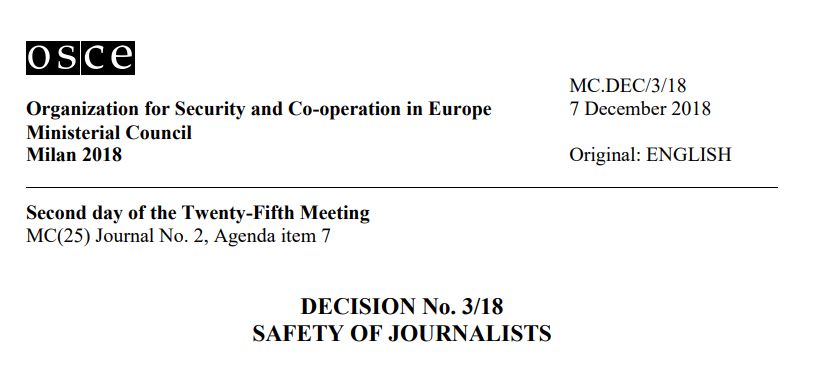
DECISION No. 3/18 SAFETY OF JOURNALISTS, 7 December 2018
This consensus document agreed by all 57 OSCE participating States focuses on numerous inter-related aspects of the safety of journalists and introduces new political commitments. It calls to fully implement all OSCE commitments and their international obligations related to freedom of expression and media freedom, including to respect international obligations protecting the safety of journalists.
Go to resource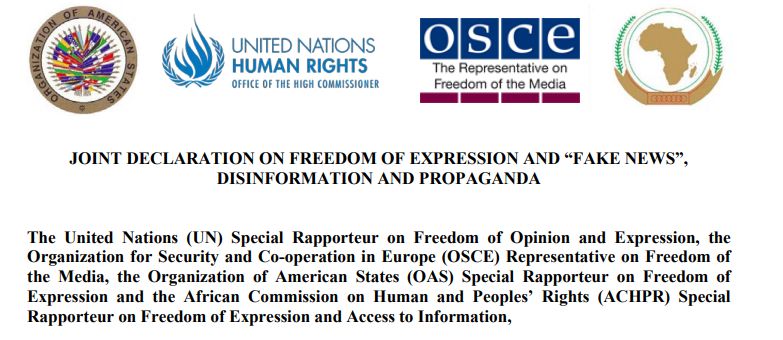
Joint Declaration on freedom of expression and “fake news”, disinformation and propaganda.
March 2017
Joint Declaration providing recommendations on combatting disinformation in accordance with international human rights standards by the UN Special Rapporteur on Freedom of Opinion and Expression, the OSCE Representative on Freedom of the Media, the OAS Special Rapporteur on Freedom of Expression and the ACHPR Special Rapporteur on Freedom of Expression and Access to Information
Go to resource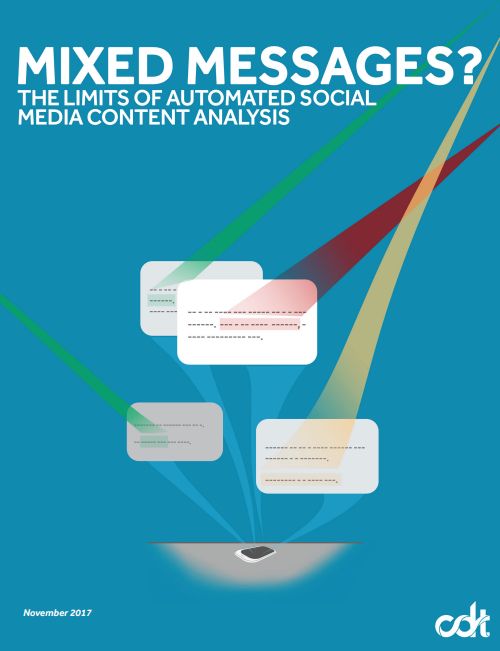
Mixed messages? The limits of automated social media content analysis
Natasha Duarte, Emma Llansó, and Anna Loup, Center for Democracy & Technology, November 2017
An in-depth analysis of the limits and potential human rights harms of using artificial intelligence and other types of automation to analyze content on social media. According to the authors, “policymakers must understand these limitations before endorsing or adopting automated content analysis tools. Without proper safeguards, these tools can facilitate overbroad censorship and biased enforcement of laws and of platforms’ terms of service.”
Go to resource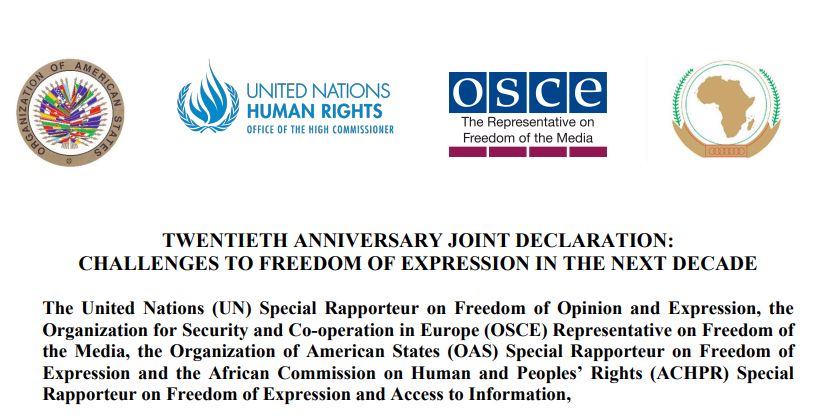
Twentieth Anniversary Joint Declaration: Challenges to Freedom of Expression in the Next Decade.
May 2016
Joint Declaration on the importance of protecting online freedom of expression in the digital age by UN Special Rapporteur on Freedom of Opinion and Expression, the OSCE Representative on Freedom of the Media, the OAS Special Rapporteur on Freedom of Expression and the ACHPR Special Rapporteur on Freedom of Expression and Access to Information.
Go to resource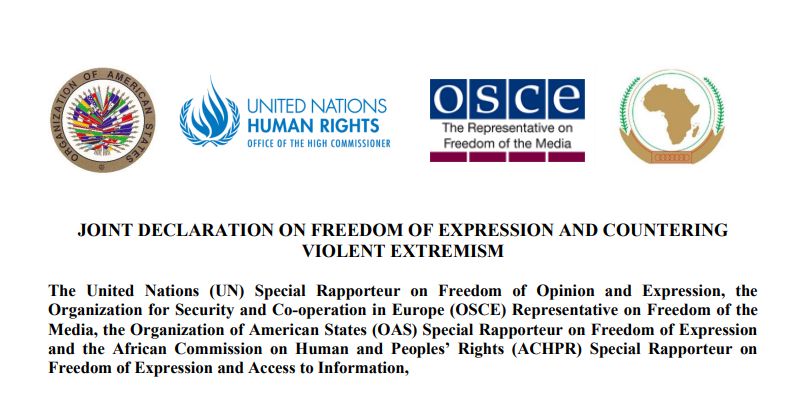
Joint Declaration on Freedom of Expression and Countering Violent Extremism
May 2016
Joint Declaration on countering violent extremist content in a way compliant with freedom of expression by the UN Special Rapporteur on Freedom of Opinion and Expression, the OSCE Representative on Freedom of the Media, the OAS Special Rapporteur on Freedom of Expression and the ACHPR Special Rapporteur on Freedom of Expression and Access to Information.
Go to resource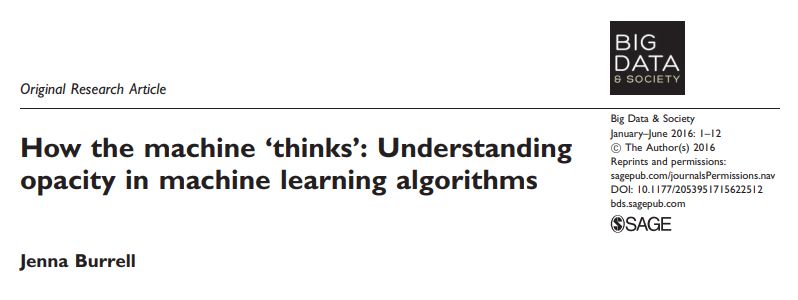
How the machine ‘thinks’: Understanding opacity in machine learning algorithms
Big Data & Society, June 2016
Jenna Burrell, a researcher from the University of California, considers the issue of algorithmic opacity as a problem for socially consequential mechanisms of classification and ranking, such as spam filters, credit card fraud detection, search engines, news trends, market segmentation and advertising, insurance or loan qualification, and credit scoring.
Go to resource
The Manila Principles
May 2015
Developed by the Electronic Frontier Foundation and other NGOs, the Manila Principles are a set of standards related to online censorship and content takedowns to help governments develop laws and processes that protect freedom of expression.
Go to resource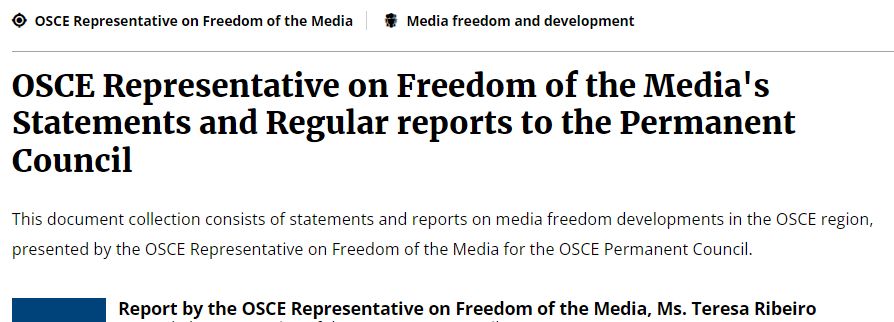
OSCE Representative on Freedom of the Media's regular reports to the Permanent Council
OSCE Representative on Freedom of the Media
A collection of reports on media freedom developments in the OSCE region, presented by the OSCE Representative on Freedom of the Media to the OSCE Permanent Council.
Go to resource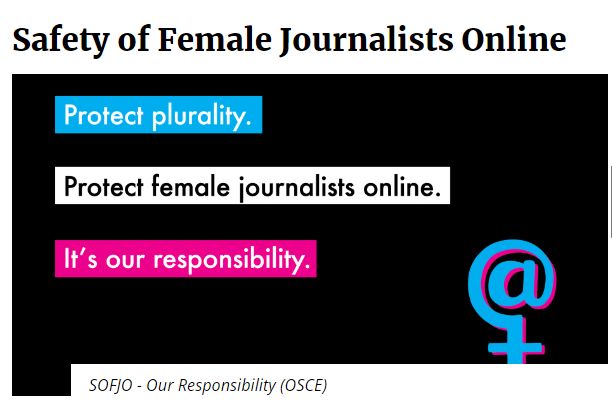
Safety of Female Journalists Online
OSCE Representative on Freedom of the Media
A repository of materials related to the Office of the OSCE Representative on Freedom of the Media’s project on the Safety of Female Journalists Online (SOFJO).
Go to resource
Expert roundtables on Disinformation
Organized by the OSCE Representative on Freedom of the Media
A series of expert roundtables on disinformation and media freedom, organized by the Office of the OSCE Representative on Freedom of the Media.
Go to resource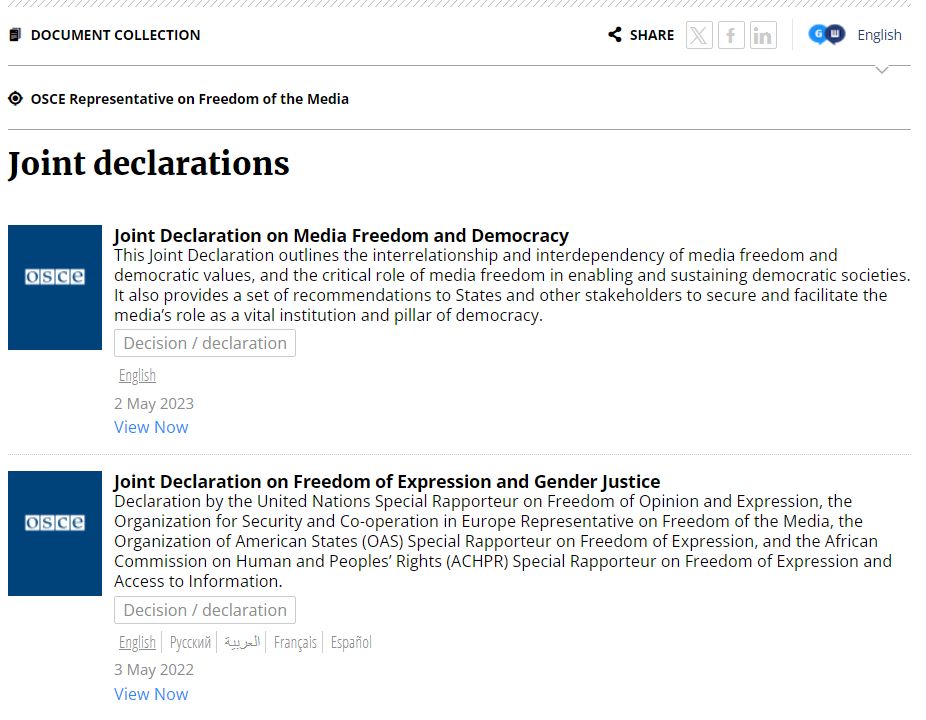
Joint Declarations
International free speech mandate holders
A collection of the Joint Declarations launched by the OSCE Representative on Freedom of the Media, the UN Special Rapporteur on Freedom of Opinion and Expression, the Organization of American States (OAS) Special Rapporteur on Freedom of Expression, and the African Commission on Human and Peoples’ Rights (ACHPR) Special Rapporteur on Freedom of Expression and Access to Information.
Go to resource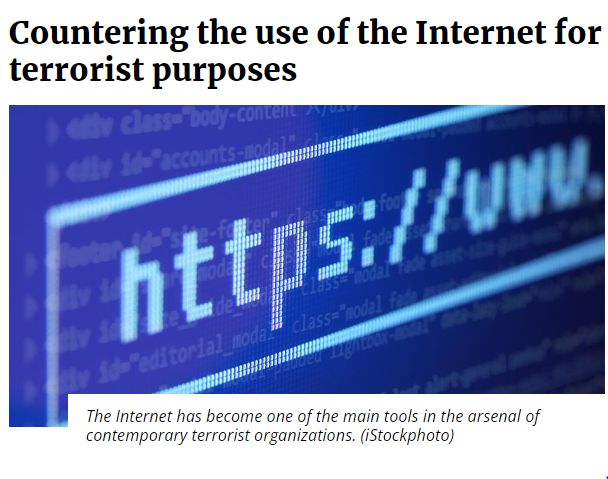
Countering the use of the Internet for terrorist purposes
OSCE Representative on Freedom of the Media
A collection of materials pertaining to the OSCE Representative on Freedom of the Media’s initiatives to promoting human rights compliant and gender-mainstreamed best practices aimed at effectively preventing and countering violent extremism and terrorism online.
Go to resource
AI Observatory
A project by individuals and communities in India affected by artificial intelligence and automated decision-making systems, which evaluates and breaks down how these technologies are used by government institutions in India.
Go to resource